Economic, Socio-cultural and Environmental impacts of tourism on local community - In the perception of Maafushi Islanders
VerifiedAdded on 2022/10/14
|29
|6684
|250
AI Summary
This research proposal aims to explore the economic, socio-cultural and environmental impacts of tourism on the local community in Maafushi Island, Maldives. The study will focus on the perception of Maafushi Islanders towards the increasing hotel and guest house activities in the area. The research questions and objectives will be answered through a survey approach and data analysis. The findings of this study will be significant to the local community, policy makers, researchers, hoteliers, tourists and visitors alike.
Contribute Materials
Your contribution can guide someone’s learning journey. Share your
documents today.
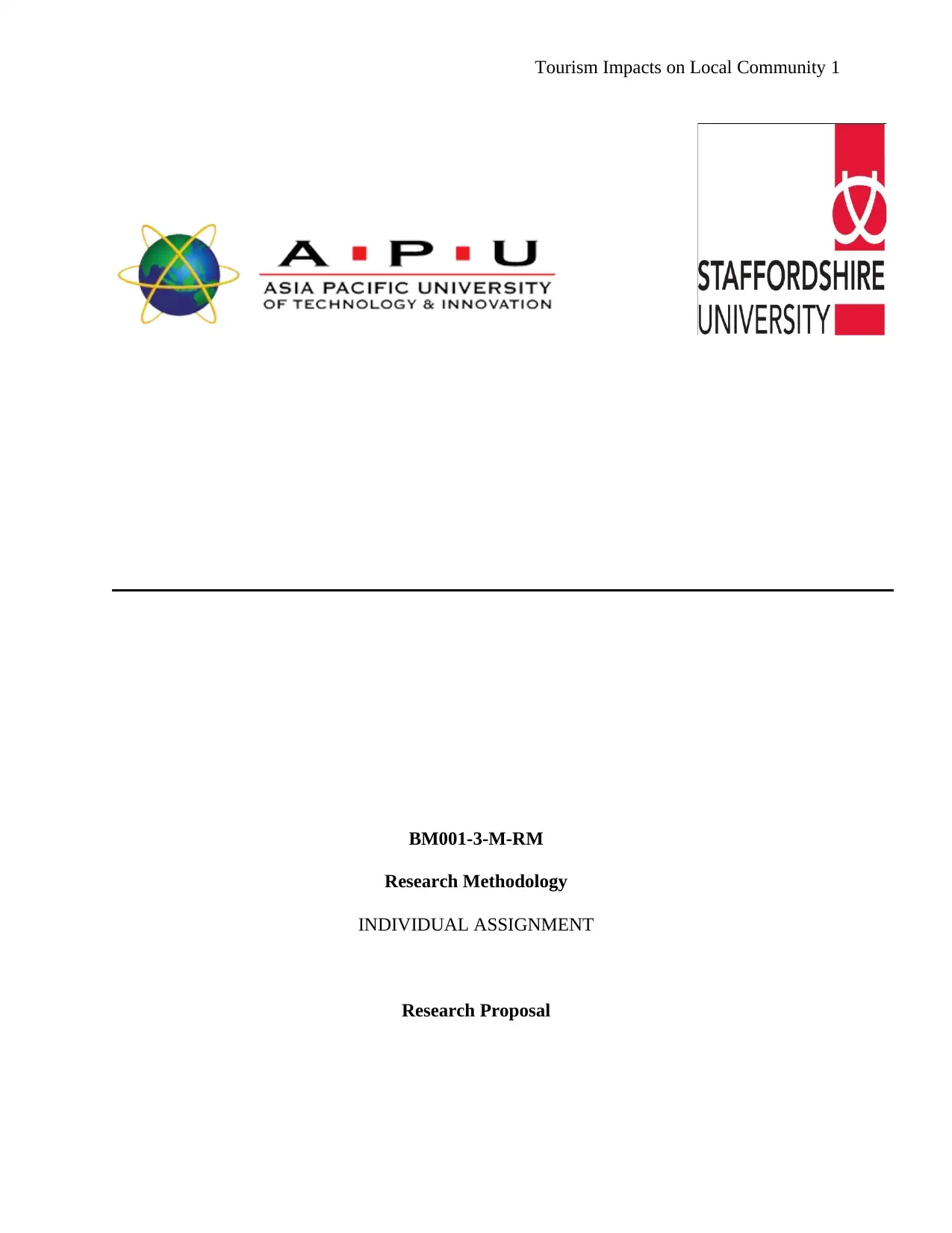
Tourism Impacts on Local Community 1
BM001-3-M-RM
Research Methodology
INDIVIDUAL ASSIGNMENT
Research Proposal
BM001-3-M-RM
Research Methodology
INDIVIDUAL ASSIGNMENT
Research Proposal
Secure Best Marks with AI Grader
Need help grading? Try our AI Grader for instant feedback on your assignments.
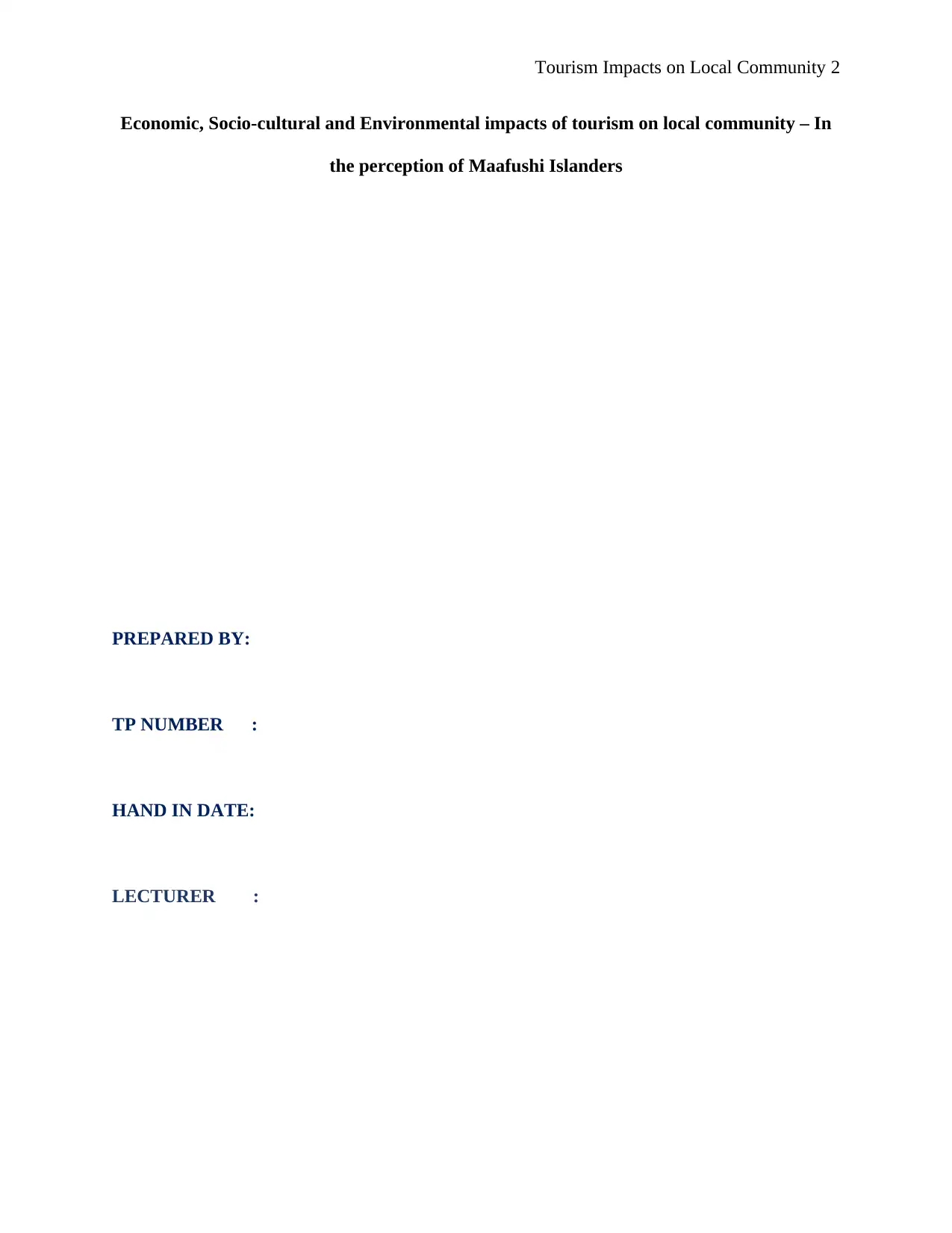
Tourism Impacts on Local Community 2
Economic, Socio-cultural and Environmental impacts of tourism on local community – In
the perception of Maafushi Islanders
PREPARED BY:
TP NUMBER :
HAND IN DATE:
LECTURER :
Economic, Socio-cultural and Environmental impacts of tourism on local community – In
the perception of Maafushi Islanders
PREPARED BY:
TP NUMBER :
HAND IN DATE:
LECTURER :
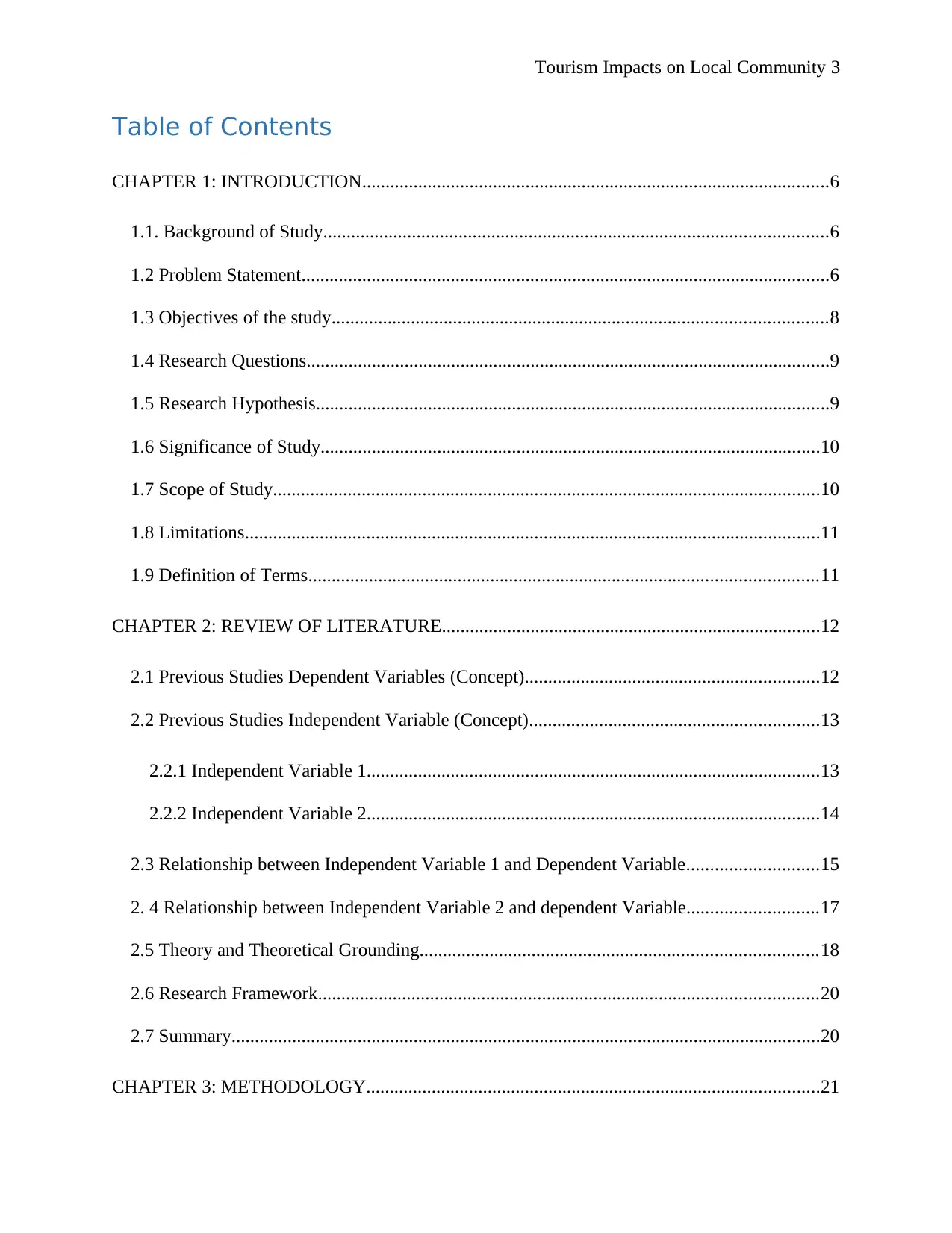
Tourism Impacts on Local Community 3
Table of Contents
CHAPTER 1: INTRODUCTION....................................................................................................6
1.1. Background of Study............................................................................................................6
1.2 Problem Statement.................................................................................................................6
1.3 Objectives of the study..........................................................................................................8
1.4 Research Questions................................................................................................................9
1.5 Research Hypothesis..............................................................................................................9
1.6 Significance of Study...........................................................................................................10
1.7 Scope of Study.....................................................................................................................10
1.8 Limitations...........................................................................................................................11
1.9 Definition of Terms.............................................................................................................11
CHAPTER 2: REVIEW OF LITERATURE.................................................................................12
2.1 Previous Studies Dependent Variables (Concept)...............................................................12
2.2 Previous Studies Independent Variable (Concept)..............................................................13
2.2.1 Independent Variable 1.................................................................................................13
2.2.2 Independent Variable 2.................................................................................................14
2.3 Relationship between Independent Variable 1 and Dependent Variable............................15
2. 4 Relationship between Independent Variable 2 and dependent Variable............................17
2.5 Theory and Theoretical Grounding.....................................................................................18
2.6 Research Framework...........................................................................................................20
2.7 Summary..............................................................................................................................20
CHAPTER 3: METHODOLOGY.................................................................................................21
Table of Contents
CHAPTER 1: INTRODUCTION....................................................................................................6
1.1. Background of Study............................................................................................................6
1.2 Problem Statement.................................................................................................................6
1.3 Objectives of the study..........................................................................................................8
1.4 Research Questions................................................................................................................9
1.5 Research Hypothesis..............................................................................................................9
1.6 Significance of Study...........................................................................................................10
1.7 Scope of Study.....................................................................................................................10
1.8 Limitations...........................................................................................................................11
1.9 Definition of Terms.............................................................................................................11
CHAPTER 2: REVIEW OF LITERATURE.................................................................................12
2.1 Previous Studies Dependent Variables (Concept)...............................................................12
2.2 Previous Studies Independent Variable (Concept)..............................................................13
2.2.1 Independent Variable 1.................................................................................................13
2.2.2 Independent Variable 2.................................................................................................14
2.3 Relationship between Independent Variable 1 and Dependent Variable............................15
2. 4 Relationship between Independent Variable 2 and dependent Variable............................17
2.5 Theory and Theoretical Grounding.....................................................................................18
2.6 Research Framework...........................................................................................................20
2.7 Summary..............................................................................................................................20
CHAPTER 3: METHODOLOGY.................................................................................................21
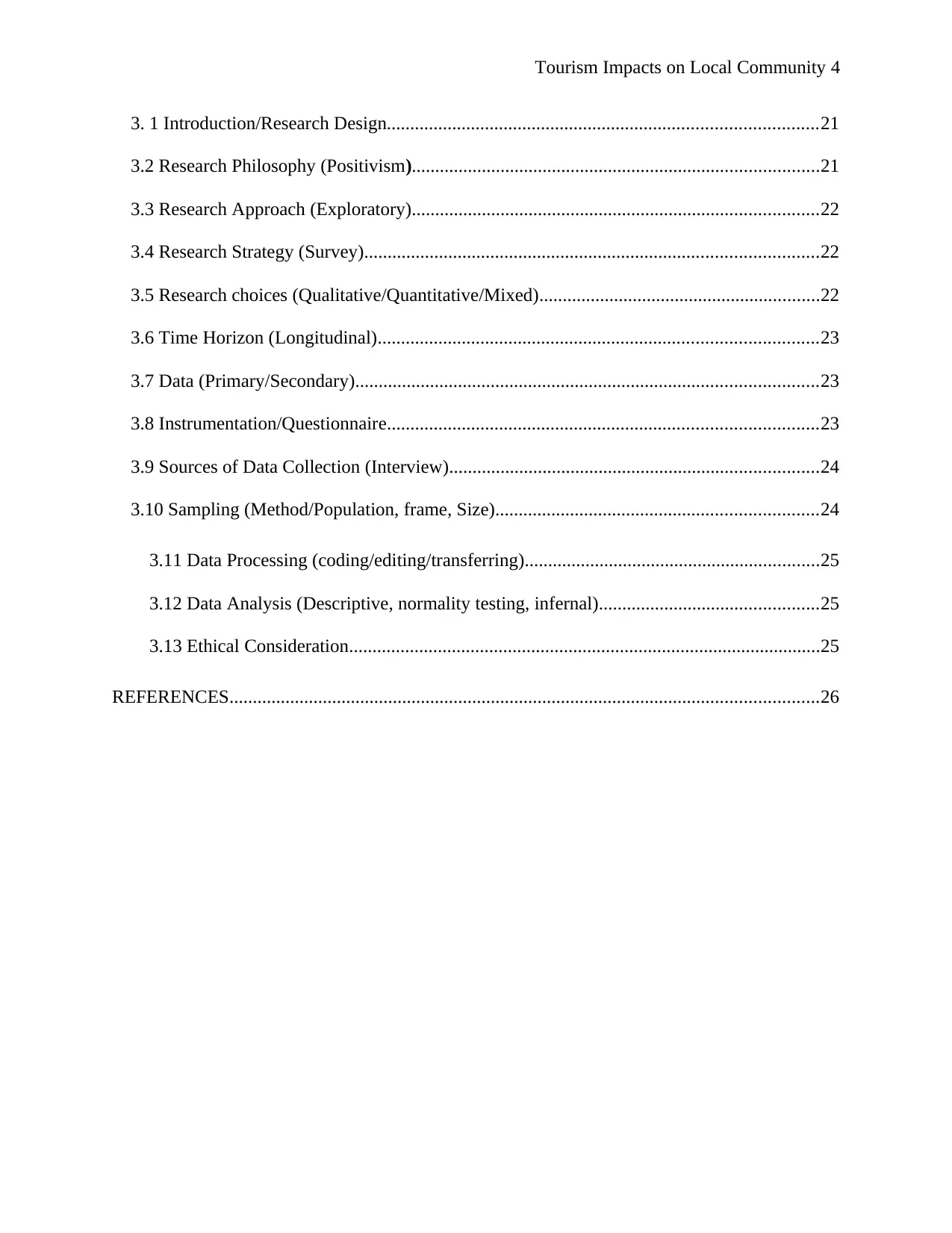
Tourism Impacts on Local Community 4
3. 1 Introduction/Research Design............................................................................................21
3.2 Research Philosophy (Positivism).......................................................................................21
3.3 Research Approach (Exploratory).......................................................................................22
3.4 Research Strategy (Survey).................................................................................................22
3.5 Research choices (Qualitative/Quantitative/Mixed)............................................................22
3.6 Time Horizon (Longitudinal)..............................................................................................23
3.7 Data (Primary/Secondary)...................................................................................................23
3.8 Instrumentation/Questionnaire............................................................................................23
3.9 Sources of Data Collection (Interview)...............................................................................24
3.10 Sampling (Method/Population, frame, Size).....................................................................24
3.11 Data Processing (coding/editing/transferring)...............................................................25
3.12 Data Analysis (Descriptive, normality testing, infernal)...............................................25
3.13 Ethical Consideration.....................................................................................................25
REFERENCES..............................................................................................................................26
3. 1 Introduction/Research Design............................................................................................21
3.2 Research Philosophy (Positivism).......................................................................................21
3.3 Research Approach (Exploratory).......................................................................................22
3.4 Research Strategy (Survey).................................................................................................22
3.5 Research choices (Qualitative/Quantitative/Mixed)............................................................22
3.6 Time Horizon (Longitudinal)..............................................................................................23
3.7 Data (Primary/Secondary)...................................................................................................23
3.8 Instrumentation/Questionnaire............................................................................................23
3.9 Sources of Data Collection (Interview)...............................................................................24
3.10 Sampling (Method/Population, frame, Size).....................................................................24
3.11 Data Processing (coding/editing/transferring)...............................................................25
3.12 Data Analysis (Descriptive, normality testing, infernal)...............................................25
3.13 Ethical Consideration.....................................................................................................25
REFERENCES..............................................................................................................................26
Secure Best Marks with AI Grader
Need help grading? Try our AI Grader for instant feedback on your assignments.

Tourism Impacts on Local Community 5
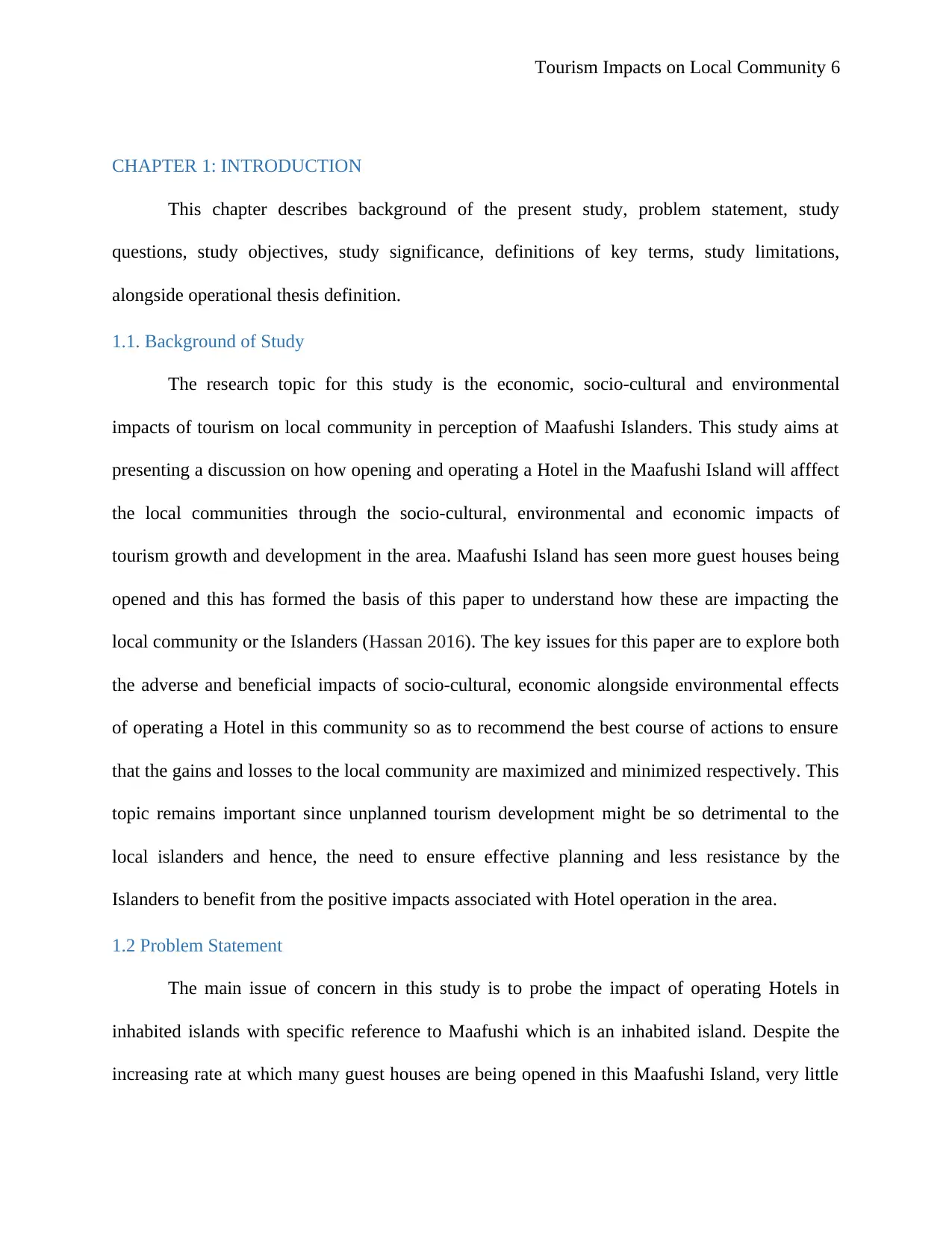
Tourism Impacts on Local Community 6
CHAPTER 1: INTRODUCTION
This chapter describes background of the present study, problem statement, study
questions, study objectives, study significance, definitions of key terms, study limitations,
alongside operational thesis definition.
1.1. Background of Study
The research topic for this study is the economic, socio-cultural and environmental
impacts of tourism on local community in perception of Maafushi Islanders. This study aims at
presenting a discussion on how opening and operating a Hotel in the Maafushi Island will afffect
the local communities through the socio-cultural, environmental and economic impacts of
tourism growth and development in the area. Maafushi Island has seen more guest houses being
opened and this has formed the basis of this paper to understand how these are impacting the
local community or the Islanders (Hassan 2016). The key issues for this paper are to explore both
the adverse and beneficial impacts of socio-cultural, economic alongside environmental effects
of operating a Hotel in this community so as to recommend the best course of actions to ensure
that the gains and losses to the local community are maximized and minimized respectively. This
topic remains important since unplanned tourism development might be so detrimental to the
local islanders and hence, the need to ensure effective planning and less resistance by the
Islanders to benefit from the positive impacts associated with Hotel operation in the area.
1.2 Problem Statement
The main issue of concern in this study is to probe the impact of operating Hotels in
inhabited islands with specific reference to Maafushi which is an inhabited island. Despite the
increasing rate at which many guest houses are being opened in this Maafushi Island, very little
CHAPTER 1: INTRODUCTION
This chapter describes background of the present study, problem statement, study
questions, study objectives, study significance, definitions of key terms, study limitations,
alongside operational thesis definition.
1.1. Background of Study
The research topic for this study is the economic, socio-cultural and environmental
impacts of tourism on local community in perception of Maafushi Islanders. This study aims at
presenting a discussion on how opening and operating a Hotel in the Maafushi Island will afffect
the local communities through the socio-cultural, environmental and economic impacts of
tourism growth and development in the area. Maafushi Island has seen more guest houses being
opened and this has formed the basis of this paper to understand how these are impacting the
local community or the Islanders (Hassan 2016). The key issues for this paper are to explore both
the adverse and beneficial impacts of socio-cultural, economic alongside environmental effects
of operating a Hotel in this community so as to recommend the best course of actions to ensure
that the gains and losses to the local community are maximized and minimized respectively. This
topic remains important since unplanned tourism development might be so detrimental to the
local islanders and hence, the need to ensure effective planning and less resistance by the
Islanders to benefit from the positive impacts associated with Hotel operation in the area.
1.2 Problem Statement
The main issue of concern in this study is to probe the impact of operating Hotels in
inhabited islands with specific reference to Maafushi which is an inhabited island. Despite the
increasing rate at which many guest houses are being opened in this Maafushi Island, very little
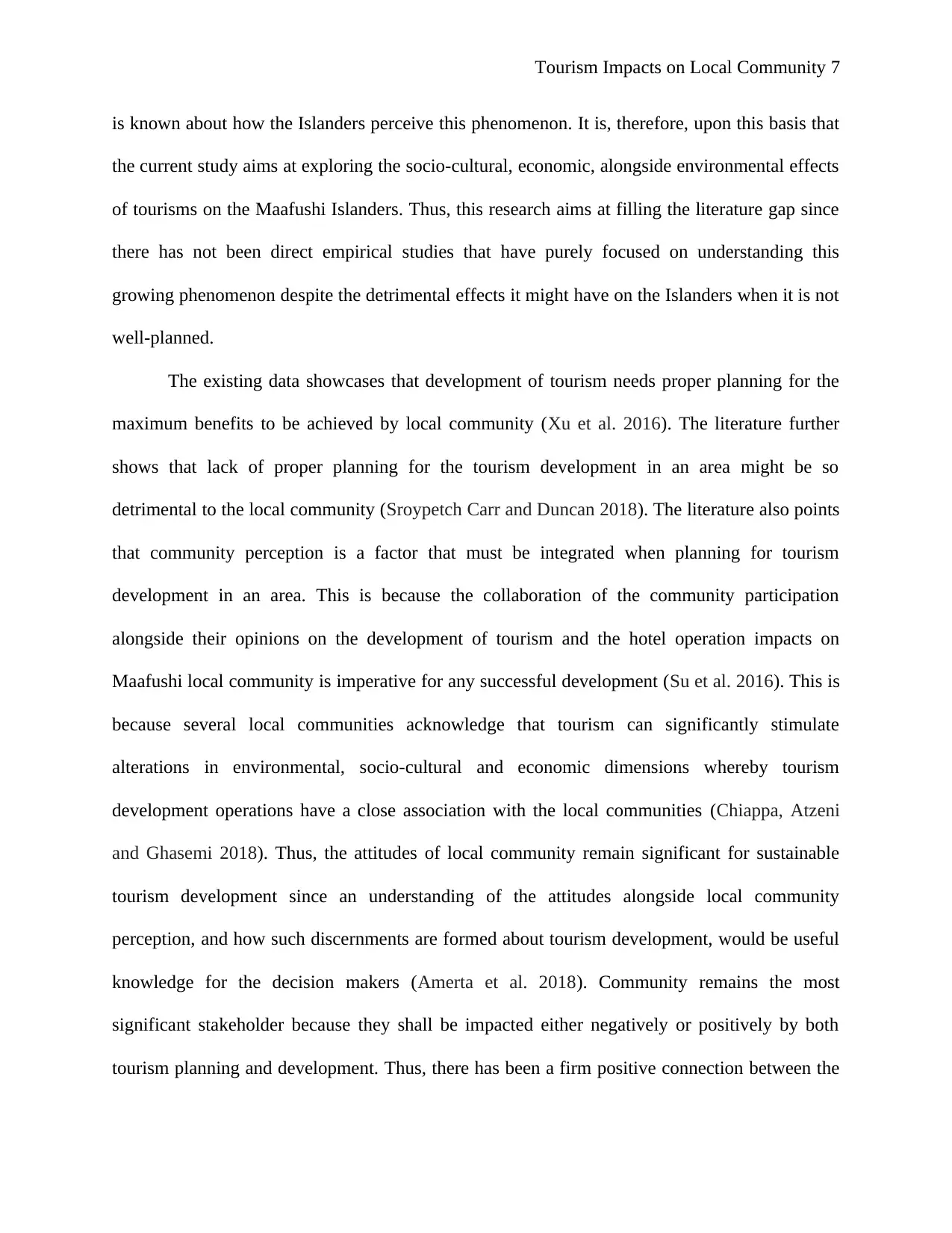
Tourism Impacts on Local Community 7
is known about how the Islanders perceive this phenomenon. It is, therefore, upon this basis that
the current study aims at exploring the socio-cultural, economic, alongside environmental effects
of tourisms on the Maafushi Islanders. Thus, this research aims at filling the literature gap since
there has not been direct empirical studies that have purely focused on understanding this
growing phenomenon despite the detrimental effects it might have on the Islanders when it is not
well-planned.
The existing data showcases that development of tourism needs proper planning for the
maximum benefits to be achieved by local community (Xu et al. 2016). The literature further
shows that lack of proper planning for the tourism development in an area might be so
detrimental to the local community (Sroypetch Carr and Duncan 2018). The literature also points
that community perception is a factor that must be integrated when planning for tourism
development in an area. This is because the collaboration of the community participation
alongside their opinions on the development of tourism and the hotel operation impacts on
Maafushi local community is imperative for any successful development (Su et al. 2016). This is
because several local communities acknowledge that tourism can significantly stimulate
alterations in environmental, socio-cultural and economic dimensions whereby tourism
development operations have a close association with the local communities (Chiappa, Atzeni
and Ghasemi 2018). Thus, the attitudes of local community remain significant for sustainable
tourism development since an understanding of the attitudes alongside local community
perception, and how such discernments are formed about tourism development, would be useful
knowledge for the decision makers (Amerta et al. 2018). Community remains the most
significant stakeholder because they shall be impacted either negatively or positively by both
tourism planning and development. Thus, there has been a firm positive connection between the
is known about how the Islanders perceive this phenomenon. It is, therefore, upon this basis that
the current study aims at exploring the socio-cultural, economic, alongside environmental effects
of tourisms on the Maafushi Islanders. Thus, this research aims at filling the literature gap since
there has not been direct empirical studies that have purely focused on understanding this
growing phenomenon despite the detrimental effects it might have on the Islanders when it is not
well-planned.
The existing data showcases that development of tourism needs proper planning for the
maximum benefits to be achieved by local community (Xu et al. 2016). The literature further
shows that lack of proper planning for the tourism development in an area might be so
detrimental to the local community (Sroypetch Carr and Duncan 2018). The literature also points
that community perception is a factor that must be integrated when planning for tourism
development in an area. This is because the collaboration of the community participation
alongside their opinions on the development of tourism and the hotel operation impacts on
Maafushi local community is imperative for any successful development (Su et al. 2016). This is
because several local communities acknowledge that tourism can significantly stimulate
alterations in environmental, socio-cultural and economic dimensions whereby tourism
development operations have a close association with the local communities (Chiappa, Atzeni
and Ghasemi 2018). Thus, the attitudes of local community remain significant for sustainable
tourism development since an understanding of the attitudes alongside local community
perception, and how such discernments are formed about tourism development, would be useful
knowledge for the decision makers (Amerta et al. 2018). Community remains the most
significant stakeholder because they shall be impacted either negatively or positively by both
tourism planning and development. Thus, there has been a firm positive connection between the
Paraphrase This Document
Need a fresh take? Get an instant paraphrase of this document with our AI Paraphraser
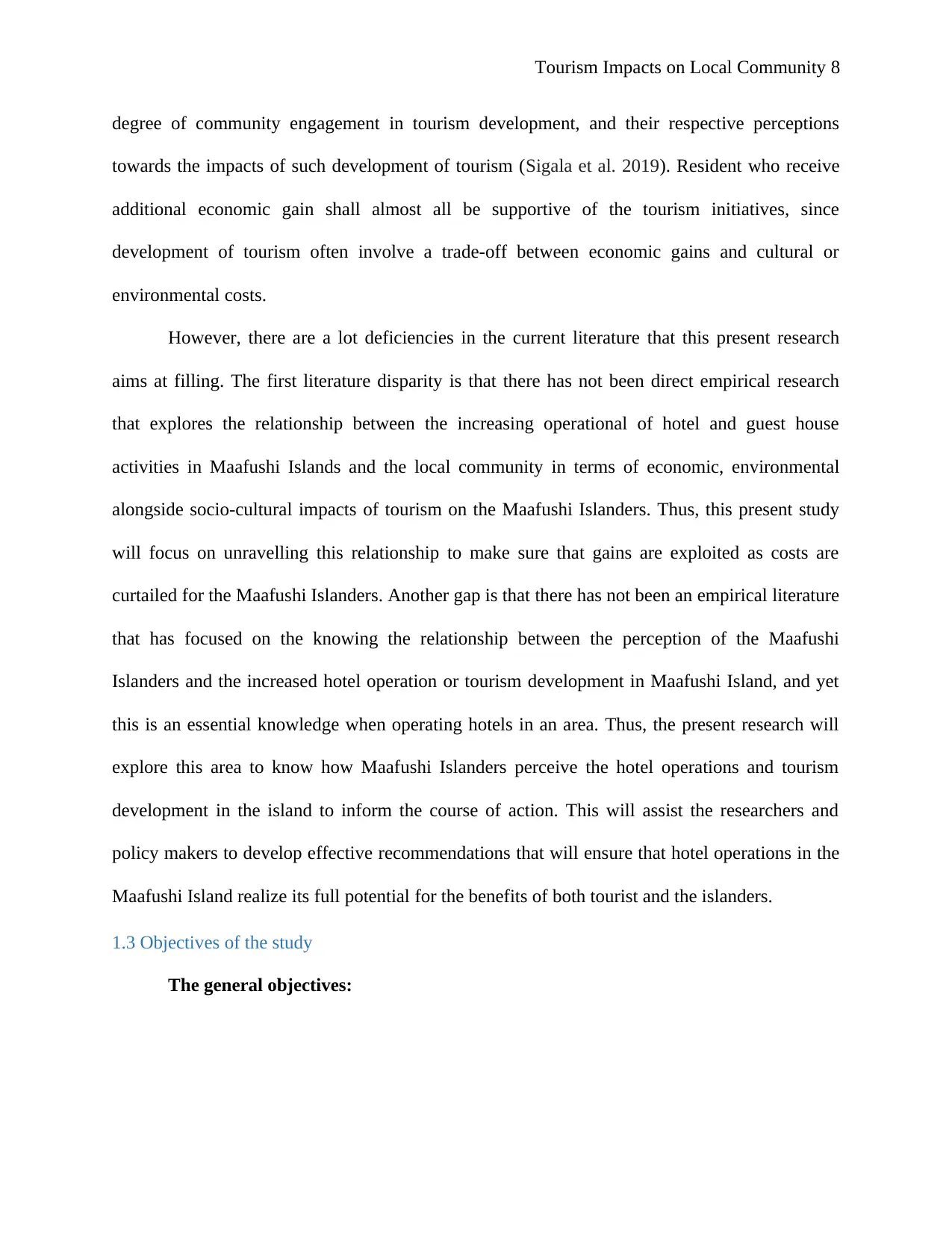
Tourism Impacts on Local Community 8
degree of community engagement in tourism development, and their respective perceptions
towards the impacts of such development of tourism (Sigala et al. 2019). Resident who receive
additional economic gain shall almost all be supportive of the tourism initiatives, since
development of tourism often involve a trade-off between economic gains and cultural or
environmental costs.
However, there are a lot deficiencies in the current literature that this present research
aims at filling. The first literature disparity is that there has not been direct empirical research
that explores the relationship between the increasing operational of hotel and guest house
activities in Maafushi Islands and the local community in terms of economic, environmental
alongside socio-cultural impacts of tourism on the Maafushi Islanders. Thus, this present study
will focus on unravelling this relationship to make sure that gains are exploited as costs are
curtailed for the Maafushi Islanders. Another gap is that there has not been an empirical literature
that has focused on the knowing the relationship between the perception of the Maafushi
Islanders and the increased hotel operation or tourism development in Maafushi Island, and yet
this is an essential knowledge when operating hotels in an area. Thus, the present research will
explore this area to know how Maafushi Islanders perceive the hotel operations and tourism
development in the island to inform the course of action. This will assist the researchers and
policy makers to develop effective recommendations that will ensure that hotel operations in the
Maafushi Island realize its full potential for the benefits of both tourist and the islanders.
1.3 Objectives of the study
The general objectives:
degree of community engagement in tourism development, and their respective perceptions
towards the impacts of such development of tourism (Sigala et al. 2019). Resident who receive
additional economic gain shall almost all be supportive of the tourism initiatives, since
development of tourism often involve a trade-off between economic gains and cultural or
environmental costs.
However, there are a lot deficiencies in the current literature that this present research
aims at filling. The first literature disparity is that there has not been direct empirical research
that explores the relationship between the increasing operational of hotel and guest house
activities in Maafushi Islands and the local community in terms of economic, environmental
alongside socio-cultural impacts of tourism on the Maafushi Islanders. Thus, this present study
will focus on unravelling this relationship to make sure that gains are exploited as costs are
curtailed for the Maafushi Islanders. Another gap is that there has not been an empirical literature
that has focused on the knowing the relationship between the perception of the Maafushi
Islanders and the increased hotel operation or tourism development in Maafushi Island, and yet
this is an essential knowledge when operating hotels in an area. Thus, the present research will
explore this area to know how Maafushi Islanders perceive the hotel operations and tourism
development in the island to inform the course of action. This will assist the researchers and
policy makers to develop effective recommendations that will ensure that hotel operations in the
Maafushi Island realize its full potential for the benefits of both tourist and the islanders.
1.3 Objectives of the study
The general objectives:
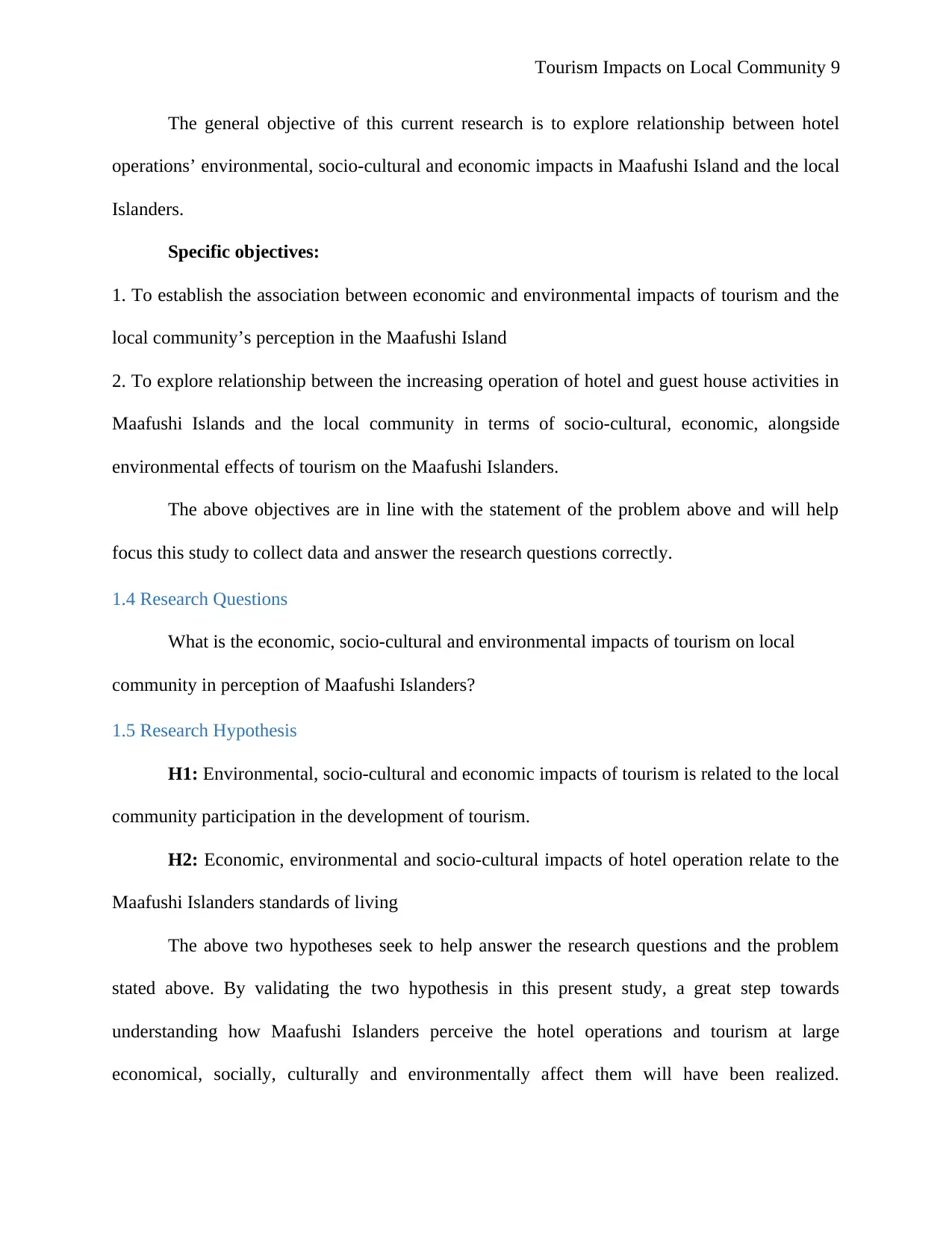
Tourism Impacts on Local Community 9
The general objective of this current research is to explore relationship between hotel
operations’ environmental, socio-cultural and economic impacts in Maafushi Island and the local
Islanders.
Specific objectives:
1. To establish the association between economic and environmental impacts of tourism and the
local community’s perception in the Maafushi Island
2. To explore relationship between the increasing operation of hotel and guest house activities in
Maafushi Islands and the local community in terms of socio-cultural, economic, alongside
environmental effects of tourism on the Maafushi Islanders.
The above objectives are in line with the statement of the problem above and will help
focus this study to collect data and answer the research questions correctly.
1.4 Research Questions
What is the economic, socio-cultural and environmental impacts of tourism on local
community in perception of Maafushi Islanders?
1.5 Research Hypothesis
H1: Environmental, socio-cultural and economic impacts of tourism is related to the local
community participation in the development of tourism.
H2: Economic, environmental and socio-cultural impacts of hotel operation relate to the
Maafushi Islanders standards of living
The above two hypotheses seek to help answer the research questions and the problem
stated above. By validating the two hypothesis in this present study, a great step towards
understanding how Maafushi Islanders perceive the hotel operations and tourism at large
economical, socially, culturally and environmentally affect them will have been realized.
The general objective of this current research is to explore relationship between hotel
operations’ environmental, socio-cultural and economic impacts in Maafushi Island and the local
Islanders.
Specific objectives:
1. To establish the association between economic and environmental impacts of tourism and the
local community’s perception in the Maafushi Island
2. To explore relationship between the increasing operation of hotel and guest house activities in
Maafushi Islands and the local community in terms of socio-cultural, economic, alongside
environmental effects of tourism on the Maafushi Islanders.
The above objectives are in line with the statement of the problem above and will help
focus this study to collect data and answer the research questions correctly.
1.4 Research Questions
What is the economic, socio-cultural and environmental impacts of tourism on local
community in perception of Maafushi Islanders?
1.5 Research Hypothesis
H1: Environmental, socio-cultural and economic impacts of tourism is related to the local
community participation in the development of tourism.
H2: Economic, environmental and socio-cultural impacts of hotel operation relate to the
Maafushi Islanders standards of living
The above two hypotheses seek to help answer the research questions and the problem
stated above. By validating the two hypothesis in this present study, a great step towards
understanding how Maafushi Islanders perceive the hotel operations and tourism at large
economical, socially, culturally and environmentally affect them will have been realized.
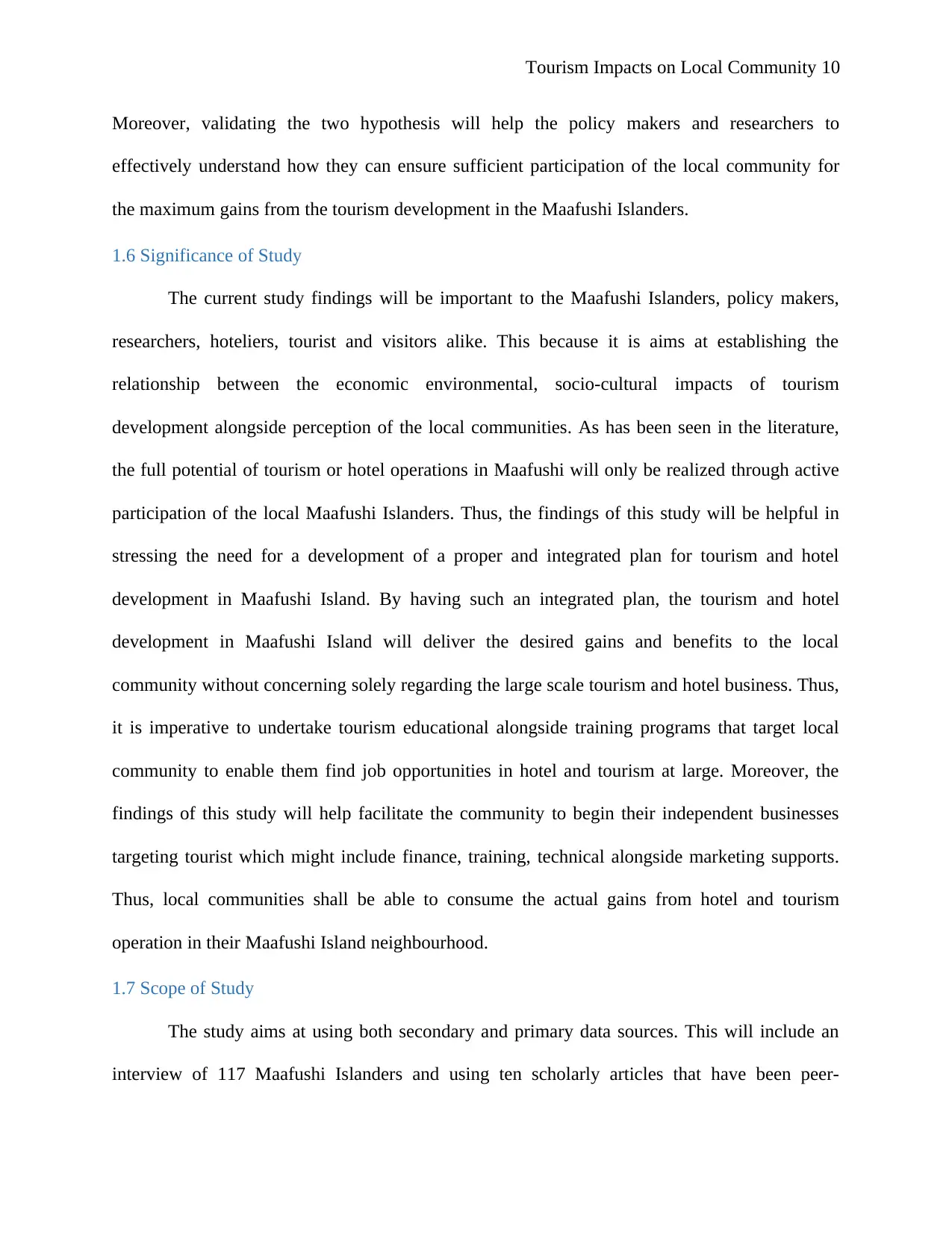
Tourism Impacts on Local Community 10
Moreover, validating the two hypothesis will help the policy makers and researchers to
effectively understand how they can ensure sufficient participation of the local community for
the maximum gains from the tourism development in the Maafushi Islanders.
1.6 Significance of Study
The current study findings will be important to the Maafushi Islanders, policy makers,
researchers, hoteliers, tourist and visitors alike. This because it is aims at establishing the
relationship between the economic environmental, socio-cultural impacts of tourism
development alongside perception of the local communities. As has been seen in the literature,
the full potential of tourism or hotel operations in Maafushi will only be realized through active
participation of the local Maafushi Islanders. Thus, the findings of this study will be helpful in
stressing the need for a development of a proper and integrated plan for tourism and hotel
development in Maafushi Island. By having such an integrated plan, the tourism and hotel
development in Maafushi Island will deliver the desired gains and benefits to the local
community without concerning solely regarding the large scale tourism and hotel business. Thus,
it is imperative to undertake tourism educational alongside training programs that target local
community to enable them find job opportunities in hotel and tourism at large. Moreover, the
findings of this study will help facilitate the community to begin their independent businesses
targeting tourist which might include finance, training, technical alongside marketing supports.
Thus, local communities shall be able to consume the actual gains from hotel and tourism
operation in their Maafushi Island neighbourhood.
1.7 Scope of Study
The study aims at using both secondary and primary data sources. This will include an
interview of 117 Maafushi Islanders and using ten scholarly articles that have been peer-
Moreover, validating the two hypothesis will help the policy makers and researchers to
effectively understand how they can ensure sufficient participation of the local community for
the maximum gains from the tourism development in the Maafushi Islanders.
1.6 Significance of Study
The current study findings will be important to the Maafushi Islanders, policy makers,
researchers, hoteliers, tourist and visitors alike. This because it is aims at establishing the
relationship between the economic environmental, socio-cultural impacts of tourism
development alongside perception of the local communities. As has been seen in the literature,
the full potential of tourism or hotel operations in Maafushi will only be realized through active
participation of the local Maafushi Islanders. Thus, the findings of this study will be helpful in
stressing the need for a development of a proper and integrated plan for tourism and hotel
development in Maafushi Island. By having such an integrated plan, the tourism and hotel
development in Maafushi Island will deliver the desired gains and benefits to the local
community without concerning solely regarding the large scale tourism and hotel business. Thus,
it is imperative to undertake tourism educational alongside training programs that target local
community to enable them find job opportunities in hotel and tourism at large. Moreover, the
findings of this study will help facilitate the community to begin their independent businesses
targeting tourist which might include finance, training, technical alongside marketing supports.
Thus, local communities shall be able to consume the actual gains from hotel and tourism
operation in their Maafushi Island neighbourhood.
1.7 Scope of Study
The study aims at using both secondary and primary data sources. This will include an
interview of 117 Maafushi Islanders and using ten scholarly articles that have been peer-
Secure Best Marks with AI Grader
Need help grading? Try our AI Grader for instant feedback on your assignments.
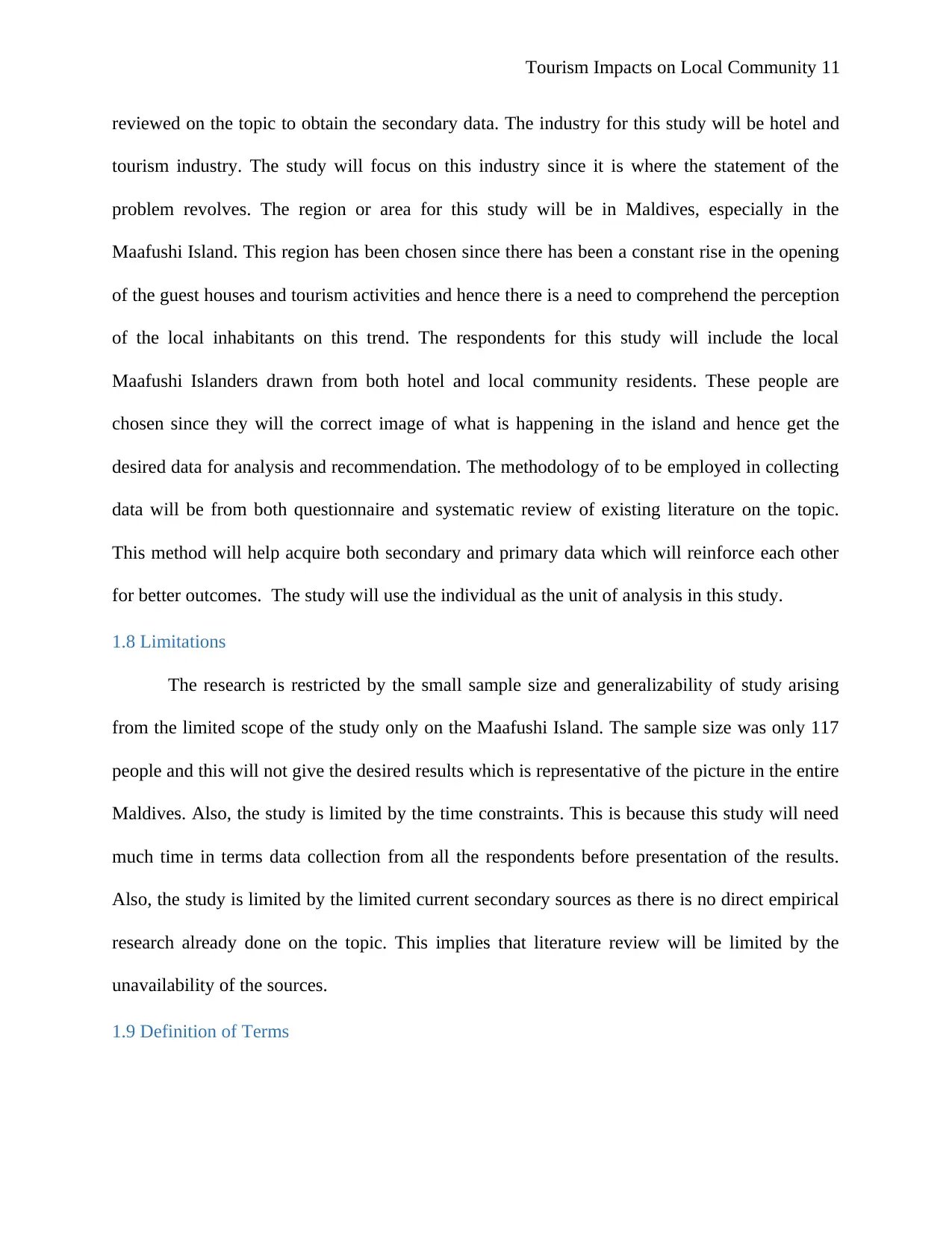
Tourism Impacts on Local Community 11
reviewed on the topic to obtain the secondary data. The industry for this study will be hotel and
tourism industry. The study will focus on this industry since it is where the statement of the
problem revolves. The region or area for this study will be in Maldives, especially in the
Maafushi Island. This region has been chosen since there has been a constant rise in the opening
of the guest houses and tourism activities and hence there is a need to comprehend the perception
of the local inhabitants on this trend. The respondents for this study will include the local
Maafushi Islanders drawn from both hotel and local community residents. These people are
chosen since they will the correct image of what is happening in the island and hence get the
desired data for analysis and recommendation. The methodology of to be employed in collecting
data will be from both questionnaire and systematic review of existing literature on the topic.
This method will help acquire both secondary and primary data which will reinforce each other
for better outcomes. The study will use the individual as the unit of analysis in this study.
1.8 Limitations
The research is restricted by the small sample size and generalizability of study arising
from the limited scope of the study only on the Maafushi Island. The sample size was only 117
people and this will not give the desired results which is representative of the picture in the entire
Maldives. Also, the study is limited by the time constraints. This is because this study will need
much time in terms data collection from all the respondents before presentation of the results.
Also, the study is limited by the limited current secondary sources as there is no direct empirical
research already done on the topic. This implies that literature review will be limited by the
unavailability of the sources.
1.9 Definition of Terms
reviewed on the topic to obtain the secondary data. The industry for this study will be hotel and
tourism industry. The study will focus on this industry since it is where the statement of the
problem revolves. The region or area for this study will be in Maldives, especially in the
Maafushi Island. This region has been chosen since there has been a constant rise in the opening
of the guest houses and tourism activities and hence there is a need to comprehend the perception
of the local inhabitants on this trend. The respondents for this study will include the local
Maafushi Islanders drawn from both hotel and local community residents. These people are
chosen since they will the correct image of what is happening in the island and hence get the
desired data for analysis and recommendation. The methodology of to be employed in collecting
data will be from both questionnaire and systematic review of existing literature on the topic.
This method will help acquire both secondary and primary data which will reinforce each other
for better outcomes. The study will use the individual as the unit of analysis in this study.
1.8 Limitations
The research is restricted by the small sample size and generalizability of study arising
from the limited scope of the study only on the Maafushi Island. The sample size was only 117
people and this will not give the desired results which is representative of the picture in the entire
Maldives. Also, the study is limited by the time constraints. This is because this study will need
much time in terms data collection from all the respondents before presentation of the results.
Also, the study is limited by the limited current secondary sources as there is no direct empirical
research already done on the topic. This implies that literature review will be limited by the
unavailability of the sources.
1.9 Definition of Terms
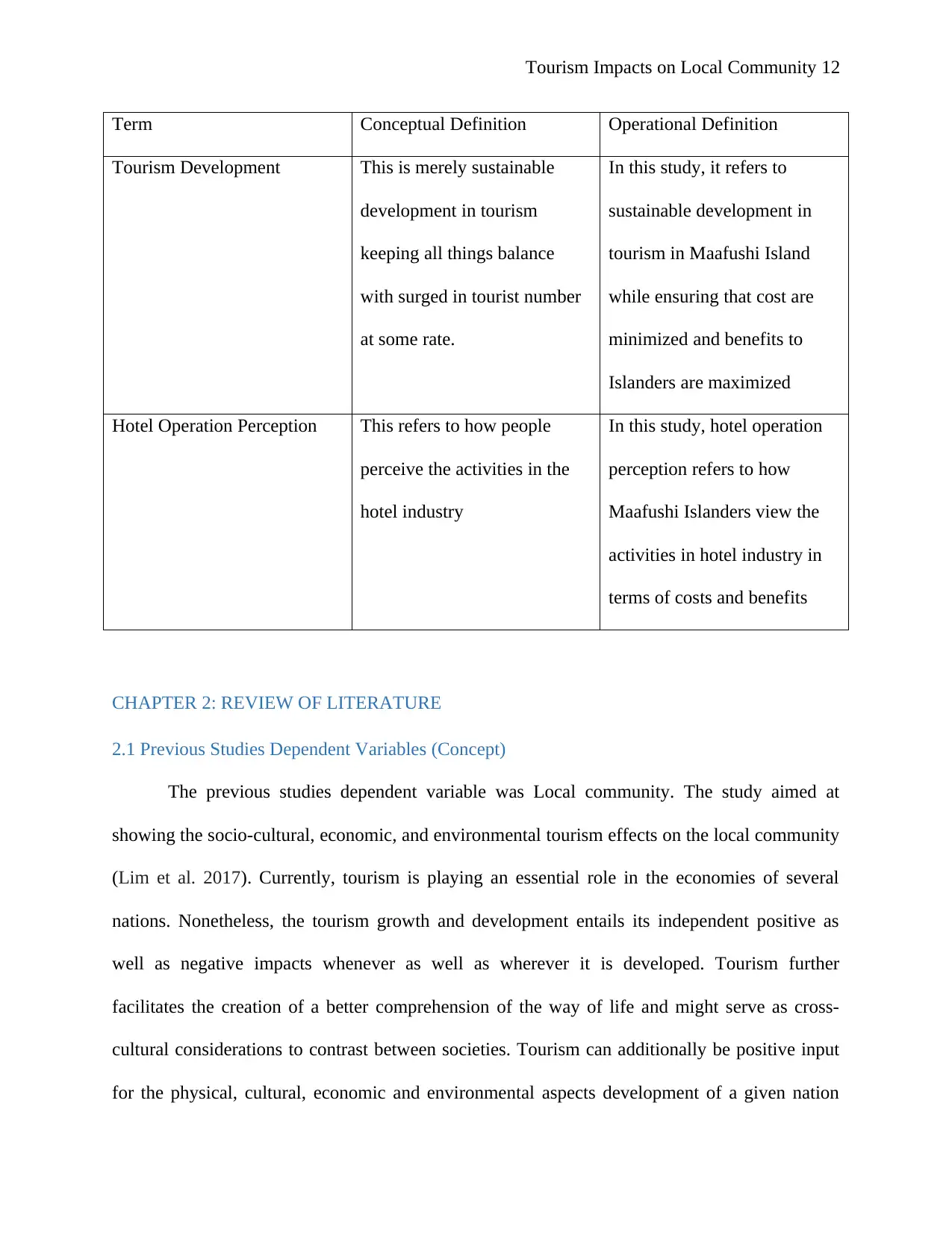
Tourism Impacts on Local Community 12
Term Conceptual Definition Operational Definition
Tourism Development This is merely sustainable
development in tourism
keeping all things balance
with surged in tourist number
at some rate.
In this study, it refers to
sustainable development in
tourism in Maafushi Island
while ensuring that cost are
minimized and benefits to
Islanders are maximized
Hotel Operation Perception This refers to how people
perceive the activities in the
hotel industry
In this study, hotel operation
perception refers to how
Maafushi Islanders view the
activities in hotel industry in
terms of costs and benefits
CHAPTER 2: REVIEW OF LITERATURE
2.1 Previous Studies Dependent Variables (Concept)
The previous studies dependent variable was Local community. The study aimed at
showing the socio-cultural, economic, and environmental tourism effects on the local community
(Lim et al. 2017). Currently, tourism is playing an essential role in the economies of several
nations. Nonetheless, the tourism growth and development entails its independent positive as
well as negative impacts whenever as well as wherever it is developed. Tourism further
facilitates the creation of a better comprehension of the way of life and might serve as cross-
cultural considerations to contrast between societies. Tourism can additionally be positive input
for the physical, cultural, economic and environmental aspects development of a given nation
Term Conceptual Definition Operational Definition
Tourism Development This is merely sustainable
development in tourism
keeping all things balance
with surged in tourist number
at some rate.
In this study, it refers to
sustainable development in
tourism in Maafushi Island
while ensuring that cost are
minimized and benefits to
Islanders are maximized
Hotel Operation Perception This refers to how people
perceive the activities in the
hotel industry
In this study, hotel operation
perception refers to how
Maafushi Islanders view the
activities in hotel industry in
terms of costs and benefits
CHAPTER 2: REVIEW OF LITERATURE
2.1 Previous Studies Dependent Variables (Concept)
The previous studies dependent variable was Local community. The study aimed at
showing the socio-cultural, economic, and environmental tourism effects on the local community
(Lim et al. 2017). Currently, tourism is playing an essential role in the economies of several
nations. Nonetheless, the tourism growth and development entails its independent positive as
well as negative impacts whenever as well as wherever it is developed. Tourism further
facilitates the creation of a better comprehension of the way of life and might serve as cross-
cultural considerations to contrast between societies. Tourism can additionally be positive input
for the physical, cultural, economic and environmental aspects development of a given nation
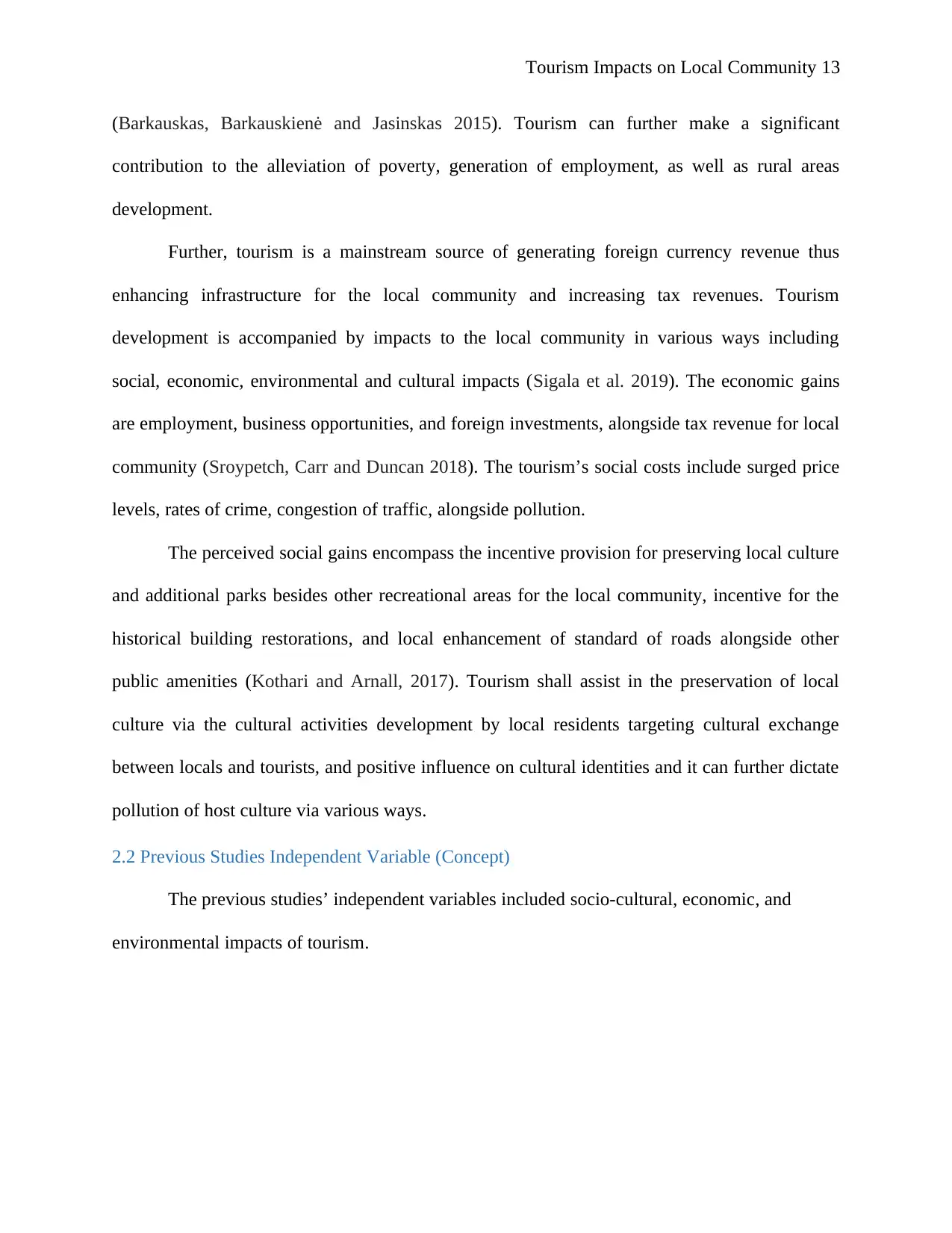
Tourism Impacts on Local Community 13
(Barkauskas, Barkauskienė and Jasinskas 2015). Tourism can further make a significant
contribution to the alleviation of poverty, generation of employment, as well as rural areas
development.
Further, tourism is a mainstream source of generating foreign currency revenue thus
enhancing infrastructure for the local community and increasing tax revenues. Tourism
development is accompanied by impacts to the local community in various ways including
social, economic, environmental and cultural impacts (Sigala et al. 2019). The economic gains
are employment, business opportunities, and foreign investments, alongside tax revenue for local
community (Sroypetch, Carr and Duncan 2018). The tourism’s social costs include surged price
levels, rates of crime, congestion of traffic, alongside pollution.
The perceived social gains encompass the incentive provision for preserving local culture
and additional parks besides other recreational areas for the local community, incentive for the
historical building restorations, and local enhancement of standard of roads alongside other
public amenities (Kothari and Arnall, 2017). Tourism shall assist in the preservation of local
culture via the cultural activities development by local residents targeting cultural exchange
between locals and tourists, and positive influence on cultural identities and it can further dictate
pollution of host culture via various ways.
2.2 Previous Studies Independent Variable (Concept)
The previous studies’ independent variables included socio-cultural, economic, and
environmental impacts of tourism.
(Barkauskas, Barkauskienė and Jasinskas 2015). Tourism can further make a significant
contribution to the alleviation of poverty, generation of employment, as well as rural areas
development.
Further, tourism is a mainstream source of generating foreign currency revenue thus
enhancing infrastructure for the local community and increasing tax revenues. Tourism
development is accompanied by impacts to the local community in various ways including
social, economic, environmental and cultural impacts (Sigala et al. 2019). The economic gains
are employment, business opportunities, and foreign investments, alongside tax revenue for local
community (Sroypetch, Carr and Duncan 2018). The tourism’s social costs include surged price
levels, rates of crime, congestion of traffic, alongside pollution.
The perceived social gains encompass the incentive provision for preserving local culture
and additional parks besides other recreational areas for the local community, incentive for the
historical building restorations, and local enhancement of standard of roads alongside other
public amenities (Kothari and Arnall, 2017). Tourism shall assist in the preservation of local
culture via the cultural activities development by local residents targeting cultural exchange
between locals and tourists, and positive influence on cultural identities and it can further dictate
pollution of host culture via various ways.
2.2 Previous Studies Independent Variable (Concept)
The previous studies’ independent variables included socio-cultural, economic, and
environmental impacts of tourism.
Paraphrase This Document
Need a fresh take? Get an instant paraphrase of this document with our AI Paraphraser
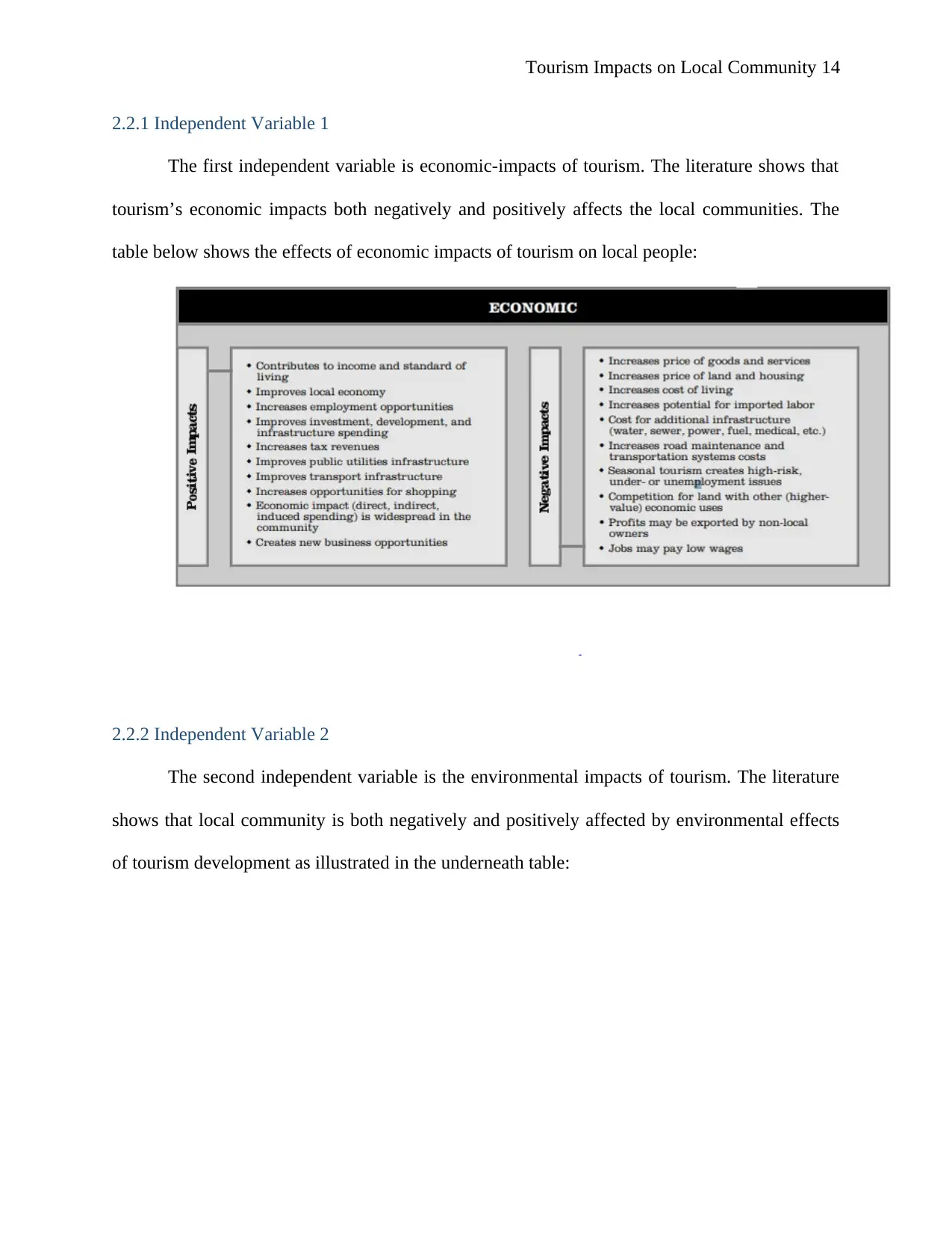
Tourism Impacts on Local Community 14
2.2.1 Independent Variable 1
The first independent variable is economic-impacts of tourism. The literature shows that
tourism’s economic impacts both negatively and positively affects the local communities. The
table below shows the effects of economic impacts of tourism on local people:
2.2.2 Independent Variable 2
The second independent variable is the environmental impacts of tourism. The literature
shows that local community is both negatively and positively affected by environmental effects
of tourism development as illustrated in the underneath table:
2.2.1 Independent Variable 1
The first independent variable is economic-impacts of tourism. The literature shows that
tourism’s economic impacts both negatively and positively affects the local communities. The
table below shows the effects of economic impacts of tourism on local people:
2.2.2 Independent Variable 2
The second independent variable is the environmental impacts of tourism. The literature
shows that local community is both negatively and positively affected by environmental effects
of tourism development as illustrated in the underneath table:
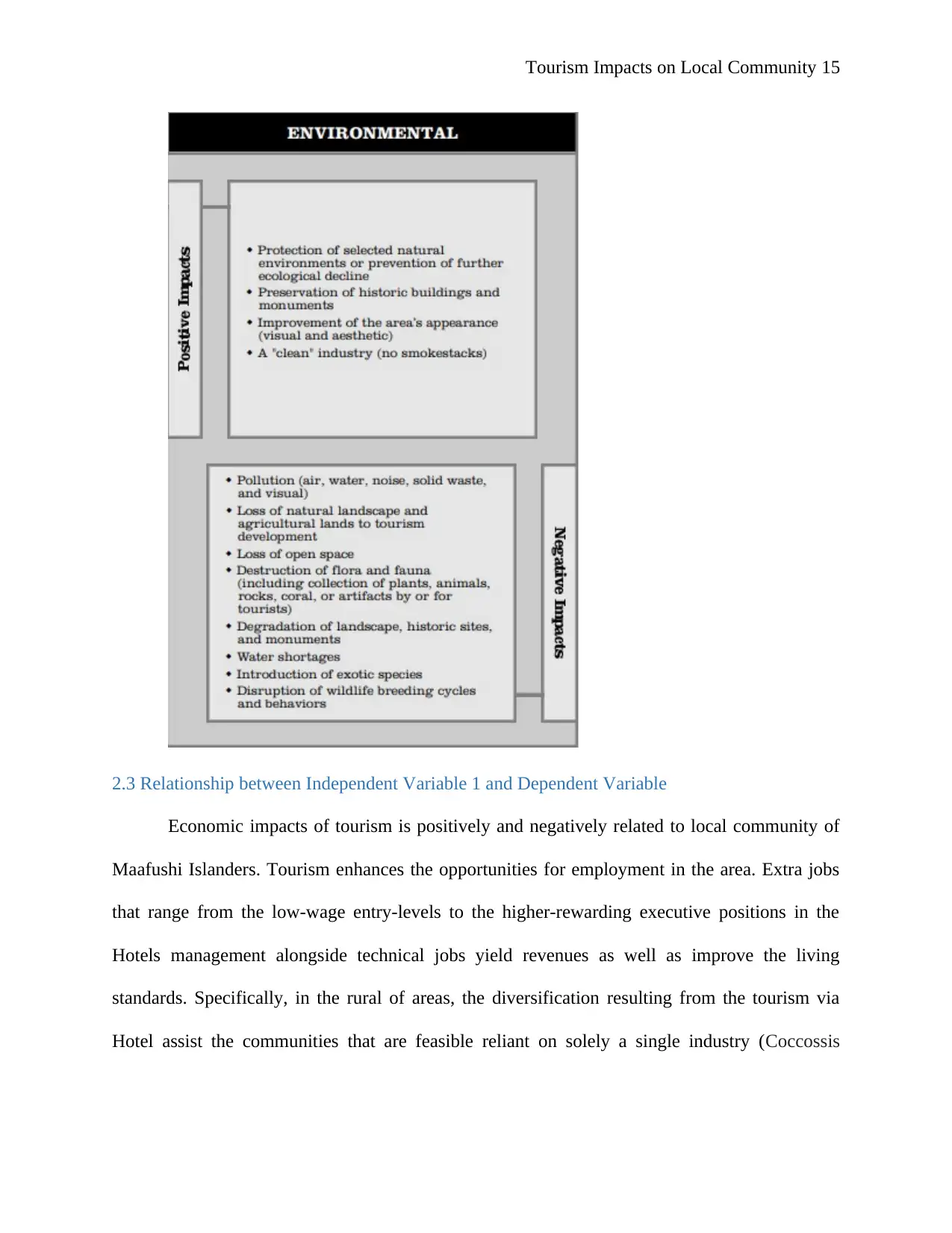
Tourism Impacts on Local Community 15
2.3 Relationship between Independent Variable 1 and Dependent Variable
Economic impacts of tourism is positively and negatively related to local community of
Maafushi Islanders. Tourism enhances the opportunities for employment in the area. Extra jobs
that range from the low-wage entry-levels to the higher-rewarding executive positions in the
Hotels management alongside technical jobs yield revenues as well as improve the living
standards. Specifically, in the rural of areas, the diversification resulting from the tourism via
Hotel assist the communities that are feasible reliant on solely a single industry (Coccossis
2.3 Relationship between Independent Variable 1 and Dependent Variable
Economic impacts of tourism is positively and negatively related to local community of
Maafushi Islanders. Tourism enhances the opportunities for employment in the area. Extra jobs
that range from the low-wage entry-levels to the higher-rewarding executive positions in the
Hotels management alongside technical jobs yield revenues as well as improve the living
standards. Specifically, in the rural of areas, the diversification resulting from the tourism via
Hotel assist the communities that are feasible reliant on solely a single industry (Coccossis
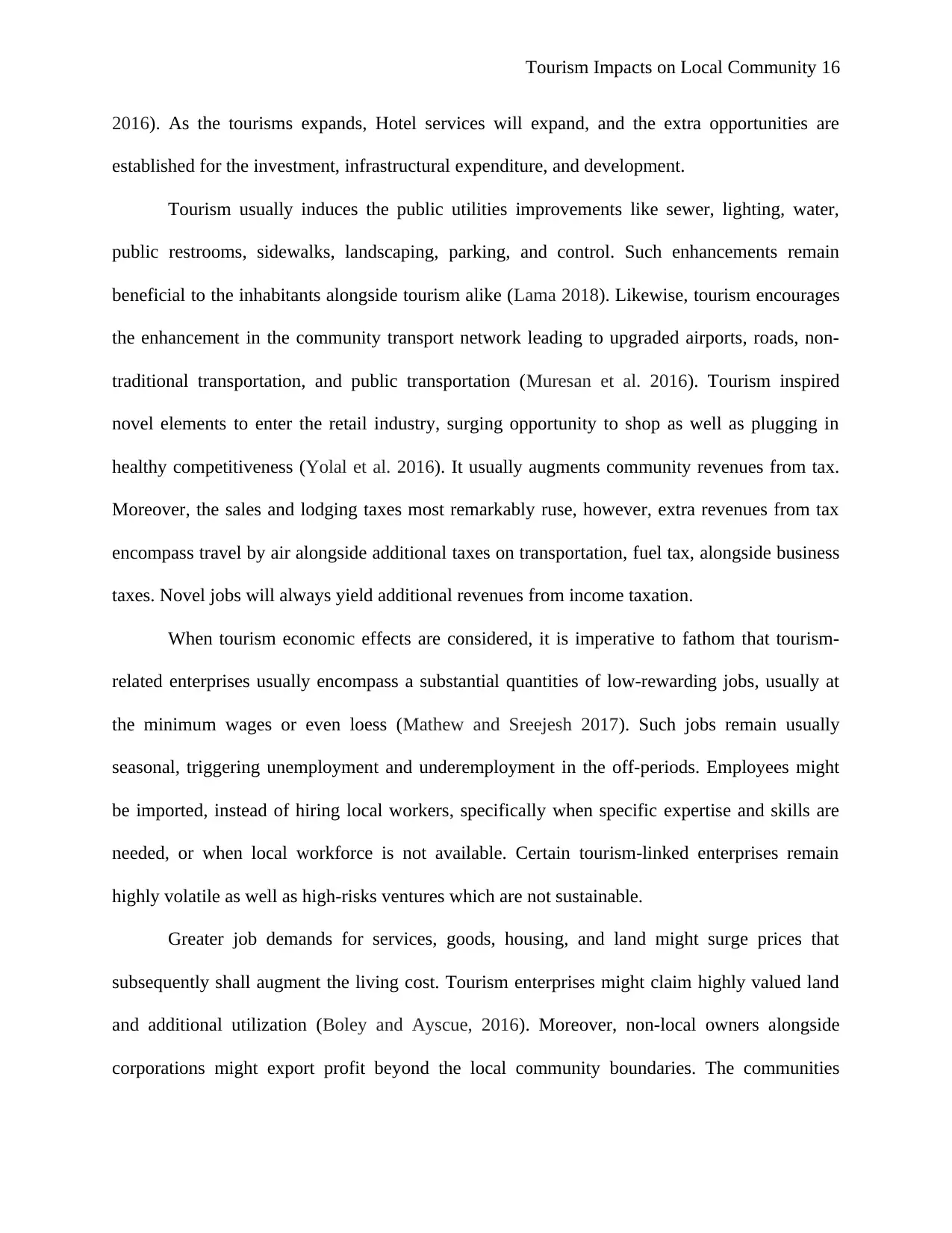
Tourism Impacts on Local Community 16
2016). As the tourisms expands, Hotel services will expand, and the extra opportunities are
established for the investment, infrastructural expenditure, and development.
Tourism usually induces the public utilities improvements like sewer, lighting, water,
public restrooms, sidewalks, landscaping, parking, and control. Such enhancements remain
beneficial to the inhabitants alongside tourism alike (Lama 2018). Likewise, tourism encourages
the enhancement in the community transport network leading to upgraded airports, roads, non-
traditional transportation, and public transportation (Muresan et al. 2016). Tourism inspired
novel elements to enter the retail industry, surging opportunity to shop as well as plugging in
healthy competitiveness (Yolal et al. 2016). It usually augments community revenues from tax.
Moreover, the sales and lodging taxes most remarkably ruse, however, extra revenues from tax
encompass travel by air alongside additional taxes on transportation, fuel tax, alongside business
taxes. Novel jobs will always yield additional revenues from income taxation.
When tourism economic effects are considered, it is imperative to fathom that tourism-
related enterprises usually encompass a substantial quantities of low-rewarding jobs, usually at
the minimum wages or even loess (Mathew and Sreejesh 2017). Such jobs remain usually
seasonal, triggering unemployment and underemployment in the off-periods. Employees might
be imported, instead of hiring local workers, specifically when specific expertise and skills are
needed, or when local workforce is not available. Certain tourism-linked enterprises remain
highly volatile as well as high-risks ventures which are not sustainable.
Greater job demands for services, goods, housing, and land might surge prices that
subsequently shall augment the living cost. Tourism enterprises might claim highly valued land
and additional utilization (Boley and Ayscue, 2016). Moreover, non-local owners alongside
corporations might export profit beyond the local community boundaries. The communities
2016). As the tourisms expands, Hotel services will expand, and the extra opportunities are
established for the investment, infrastructural expenditure, and development.
Tourism usually induces the public utilities improvements like sewer, lighting, water,
public restrooms, sidewalks, landscaping, parking, and control. Such enhancements remain
beneficial to the inhabitants alongside tourism alike (Lama 2018). Likewise, tourism encourages
the enhancement in the community transport network leading to upgraded airports, roads, non-
traditional transportation, and public transportation (Muresan et al. 2016). Tourism inspired
novel elements to enter the retail industry, surging opportunity to shop as well as plugging in
healthy competitiveness (Yolal et al. 2016). It usually augments community revenues from tax.
Moreover, the sales and lodging taxes most remarkably ruse, however, extra revenues from tax
encompass travel by air alongside additional taxes on transportation, fuel tax, alongside business
taxes. Novel jobs will always yield additional revenues from income taxation.
When tourism economic effects are considered, it is imperative to fathom that tourism-
related enterprises usually encompass a substantial quantities of low-rewarding jobs, usually at
the minimum wages or even loess (Mathew and Sreejesh 2017). Such jobs remain usually
seasonal, triggering unemployment and underemployment in the off-periods. Employees might
be imported, instead of hiring local workers, specifically when specific expertise and skills are
needed, or when local workforce is not available. Certain tourism-linked enterprises remain
highly volatile as well as high-risks ventures which are not sustainable.
Greater job demands for services, goods, housing, and land might surge prices that
subsequently shall augment the living cost. Tourism enterprises might claim highly valued land
and additional utilization (Boley and Ayscue, 2016). Moreover, non-local owners alongside
corporations might export profit beyond the local community boundaries. The communities
Secure Best Marks with AI Grader
Need help grading? Try our AI Grader for instant feedback on your assignments.
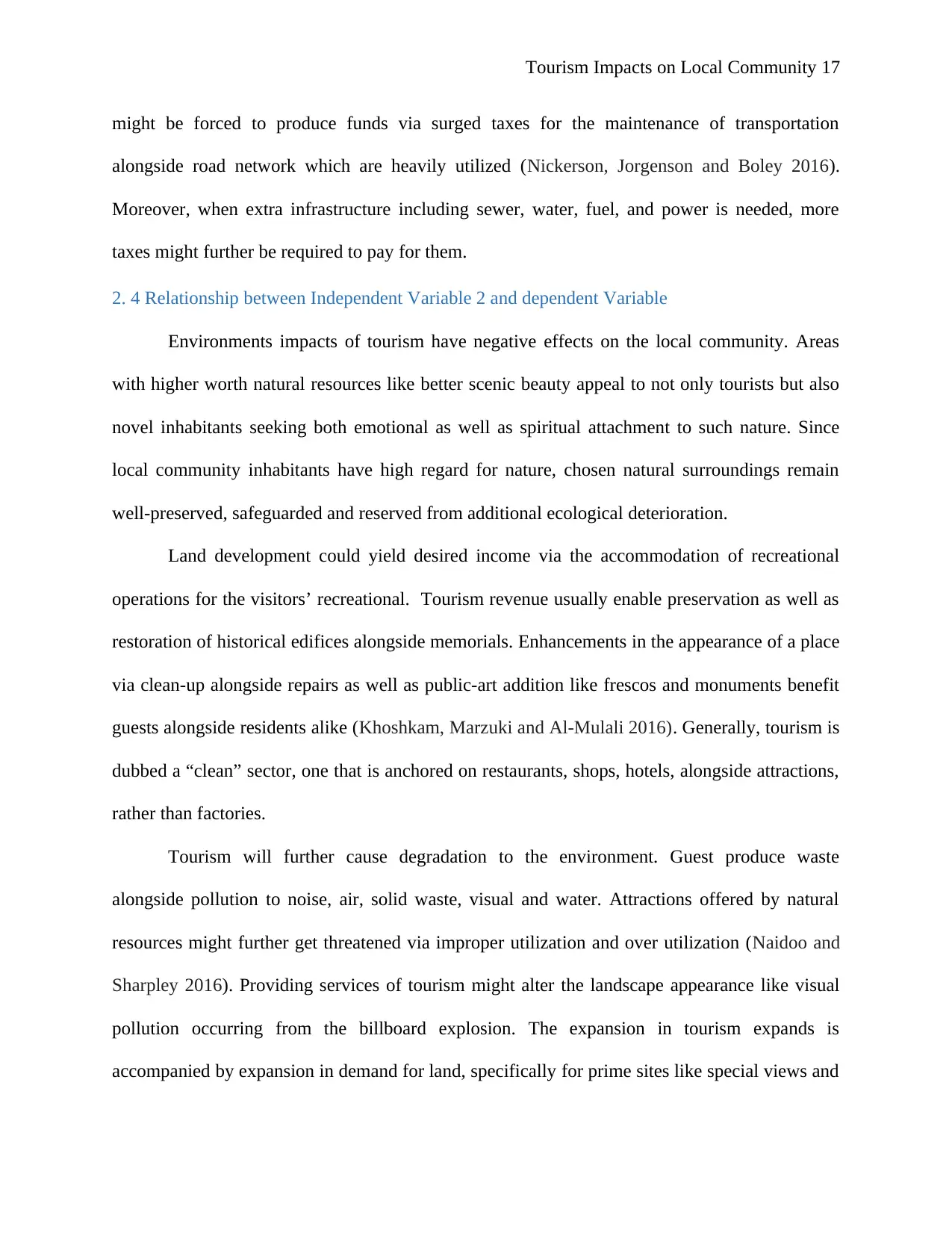
Tourism Impacts on Local Community 17
might be forced to produce funds via surged taxes for the maintenance of transportation
alongside road network which are heavily utilized (Nickerson, Jorgenson and Boley 2016).
Moreover, when extra infrastructure including sewer, water, fuel, and power is needed, more
taxes might further be required to pay for them.
2. 4 Relationship between Independent Variable 2 and dependent Variable
Environments impacts of tourism have negative effects on the local community. Areas
with higher worth natural resources like better scenic beauty appeal to not only tourists but also
novel inhabitants seeking both emotional as well as spiritual attachment to such nature. Since
local community inhabitants have high regard for nature, chosen natural surroundings remain
well-preserved, safeguarded and reserved from additional ecological deterioration.
Land development could yield desired income via the accommodation of recreational
operations for the visitors’ recreational. Tourism revenue usually enable preservation as well as
restoration of historical edifices alongside memorials. Enhancements in the appearance of a place
via clean-up alongside repairs as well as public-art addition like frescos and monuments benefit
guests alongside residents alike (Khoshkam, Marzuki and Al-Mulali 2016). Generally, tourism is
dubbed a “clean” sector, one that is anchored on restaurants, shops, hotels, alongside attractions,
rather than factories.
Tourism will further cause degradation to the environment. Guest produce waste
alongside pollution to noise, air, solid waste, visual and water. Attractions offered by natural
resources might further get threatened via improper utilization and over utilization (Naidoo and
Sharpley 2016). Providing services of tourism might alter the landscape appearance like visual
pollution occurring from the billboard explosion. The expansion in tourism expands is
accompanied by expansion in demand for land, specifically for prime sites like special views and
might be forced to produce funds via surged taxes for the maintenance of transportation
alongside road network which are heavily utilized (Nickerson, Jorgenson and Boley 2016).
Moreover, when extra infrastructure including sewer, water, fuel, and power is needed, more
taxes might further be required to pay for them.
2. 4 Relationship between Independent Variable 2 and dependent Variable
Environments impacts of tourism have negative effects on the local community. Areas
with higher worth natural resources like better scenic beauty appeal to not only tourists but also
novel inhabitants seeking both emotional as well as spiritual attachment to such nature. Since
local community inhabitants have high regard for nature, chosen natural surroundings remain
well-preserved, safeguarded and reserved from additional ecological deterioration.
Land development could yield desired income via the accommodation of recreational
operations for the visitors’ recreational. Tourism revenue usually enable preservation as well as
restoration of historical edifices alongside memorials. Enhancements in the appearance of a place
via clean-up alongside repairs as well as public-art addition like frescos and monuments benefit
guests alongside residents alike (Khoshkam, Marzuki and Al-Mulali 2016). Generally, tourism is
dubbed a “clean” sector, one that is anchored on restaurants, shops, hotels, alongside attractions,
rather than factories.
Tourism will further cause degradation to the environment. Guest produce waste
alongside pollution to noise, air, solid waste, visual and water. Attractions offered by natural
resources might further get threatened via improper utilization and over utilization (Naidoo and
Sharpley 2016). Providing services of tourism might alter the landscape appearance like visual
pollution occurring from the billboard explosion. The expansion in tourism expands is
accompanied by expansion in demand for land, specifically for prime sites like special views and
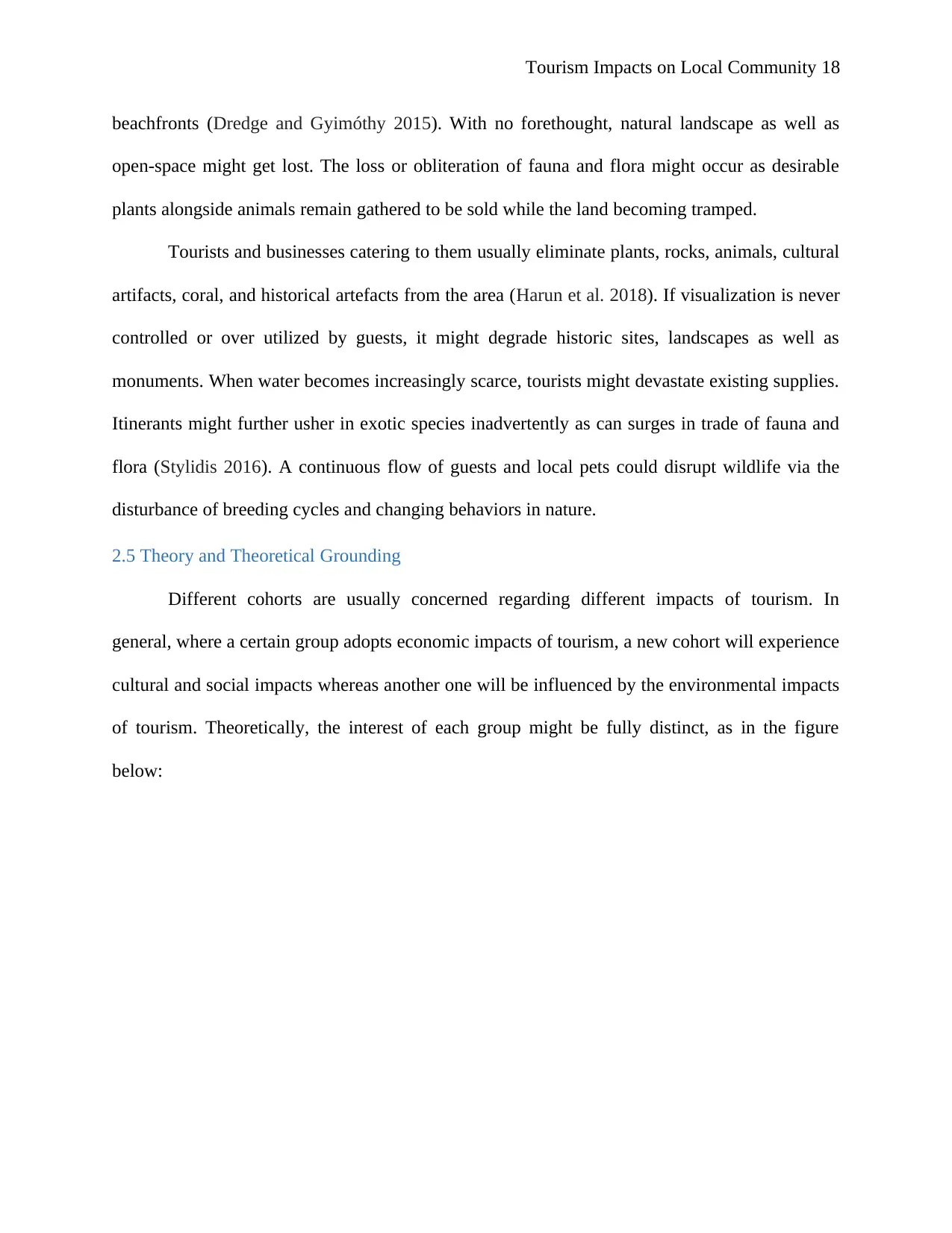
Tourism Impacts on Local Community 18
beachfronts (Dredge and Gyimóthy 2015). With no forethought, natural landscape as well as
open-space might get lost. The loss or obliteration of fauna and flora might occur as desirable
plants alongside animals remain gathered to be sold while the land becoming tramped.
Tourists and businesses catering to them usually eliminate plants, rocks, animals, cultural
artifacts, coral, and historical artefacts from the area (Harun et al. 2018). If visualization is never
controlled or over utilized by guests, it might degrade historic sites, landscapes as well as
monuments. When water becomes increasingly scarce, tourists might devastate existing supplies.
Itinerants might further usher in exotic species inadvertently as can surges in trade of fauna and
flora (Stylidis 2016). A continuous flow of guests and local pets could disrupt wildlife via the
disturbance of breeding cycles and changing behaviors in nature.
2.5 Theory and Theoretical Grounding
Different cohorts are usually concerned regarding different impacts of tourism. In
general, where a certain group adopts economic impacts of tourism, a new cohort will experience
cultural and social impacts whereas another one will be influenced by the environmental impacts
of tourism. Theoretically, the interest of each group might be fully distinct, as in the figure
below:
beachfronts (Dredge and Gyimóthy 2015). With no forethought, natural landscape as well as
open-space might get lost. The loss or obliteration of fauna and flora might occur as desirable
plants alongside animals remain gathered to be sold while the land becoming tramped.
Tourists and businesses catering to them usually eliminate plants, rocks, animals, cultural
artifacts, coral, and historical artefacts from the area (Harun et al. 2018). If visualization is never
controlled or over utilized by guests, it might degrade historic sites, landscapes as well as
monuments. When water becomes increasingly scarce, tourists might devastate existing supplies.
Itinerants might further usher in exotic species inadvertently as can surges in trade of fauna and
flora (Stylidis 2016). A continuous flow of guests and local pets could disrupt wildlife via the
disturbance of breeding cycles and changing behaviors in nature.
2.5 Theory and Theoretical Grounding
Different cohorts are usually concerned regarding different impacts of tourism. In
general, where a certain group adopts economic impacts of tourism, a new cohort will experience
cultural and social impacts whereas another one will be influenced by the environmental impacts
of tourism. Theoretically, the interest of each group might be fully distinct, as in the figure
below:
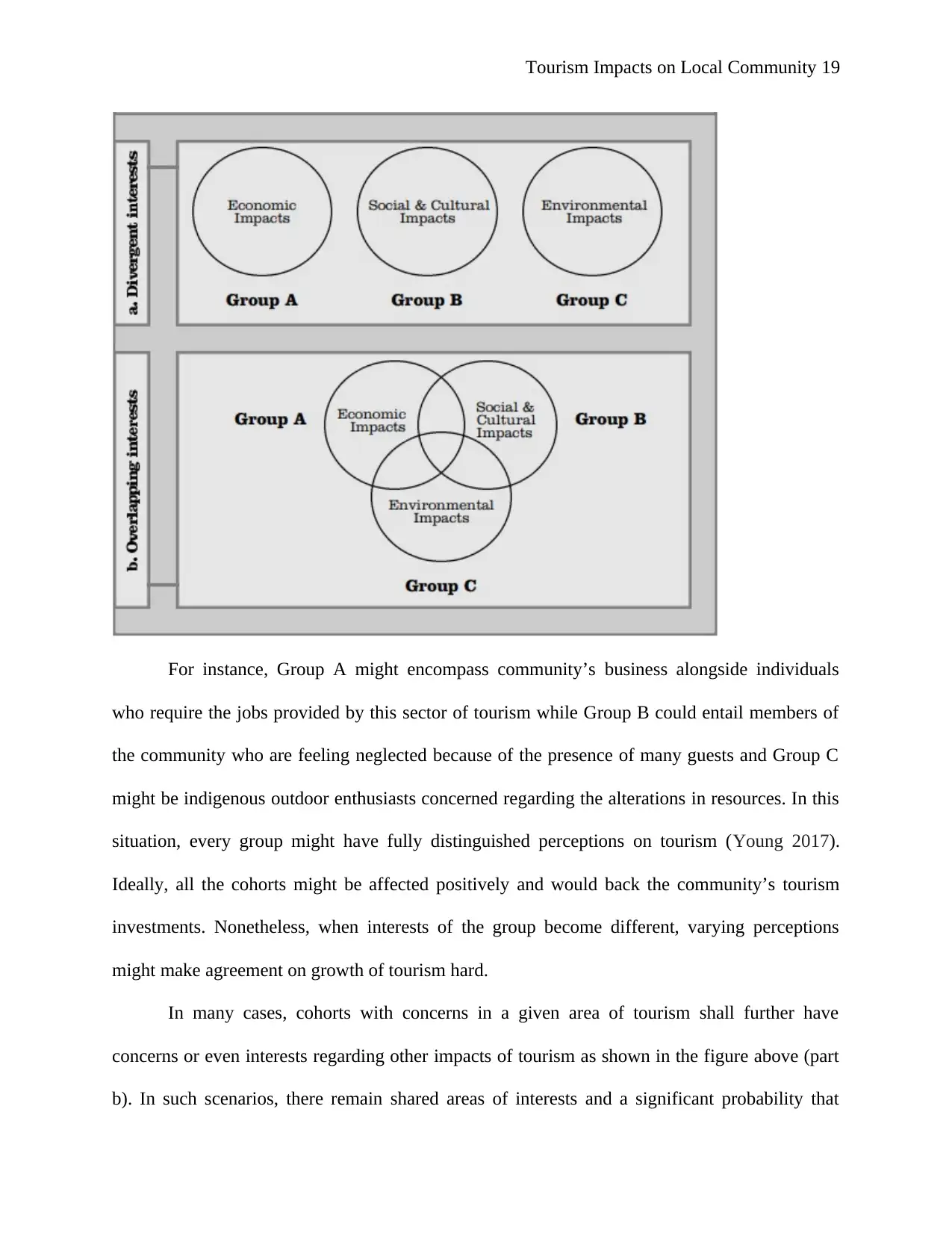
Tourism Impacts on Local Community 19
For instance, Group A might encompass community’s business alongside individuals
who require the jobs provided by this sector of tourism while Group B could entail members of
the community who are feeling neglected because of the presence of many guests and Group C
might be indigenous outdoor enthusiasts concerned regarding the alterations in resources. In this
situation, every group might have fully distinguished perceptions on tourism (Young 2017).
Ideally, all the cohorts might be affected positively and would back the community’s tourism
investments. Nonetheless, when interests of the group become different, varying perceptions
might make agreement on growth of tourism hard.
In many cases, cohorts with concerns in a given area of tourism shall further have
concerns or even interests regarding other impacts of tourism as shown in the figure above (part
b). In such scenarios, there remain shared areas of interests and a significant probability that
For instance, Group A might encompass community’s business alongside individuals
who require the jobs provided by this sector of tourism while Group B could entail members of
the community who are feeling neglected because of the presence of many guests and Group C
might be indigenous outdoor enthusiasts concerned regarding the alterations in resources. In this
situation, every group might have fully distinguished perceptions on tourism (Young 2017).
Ideally, all the cohorts might be affected positively and would back the community’s tourism
investments. Nonetheless, when interests of the group become different, varying perceptions
might make agreement on growth of tourism hard.
In many cases, cohorts with concerns in a given area of tourism shall further have
concerns or even interests regarding other impacts of tourism as shown in the figure above (part
b). In such scenarios, there remain shared areas of interests and a significant probability that
Paraphrase This Document
Need a fresh take? Get an instant paraphrase of this document with our AI Paraphraser
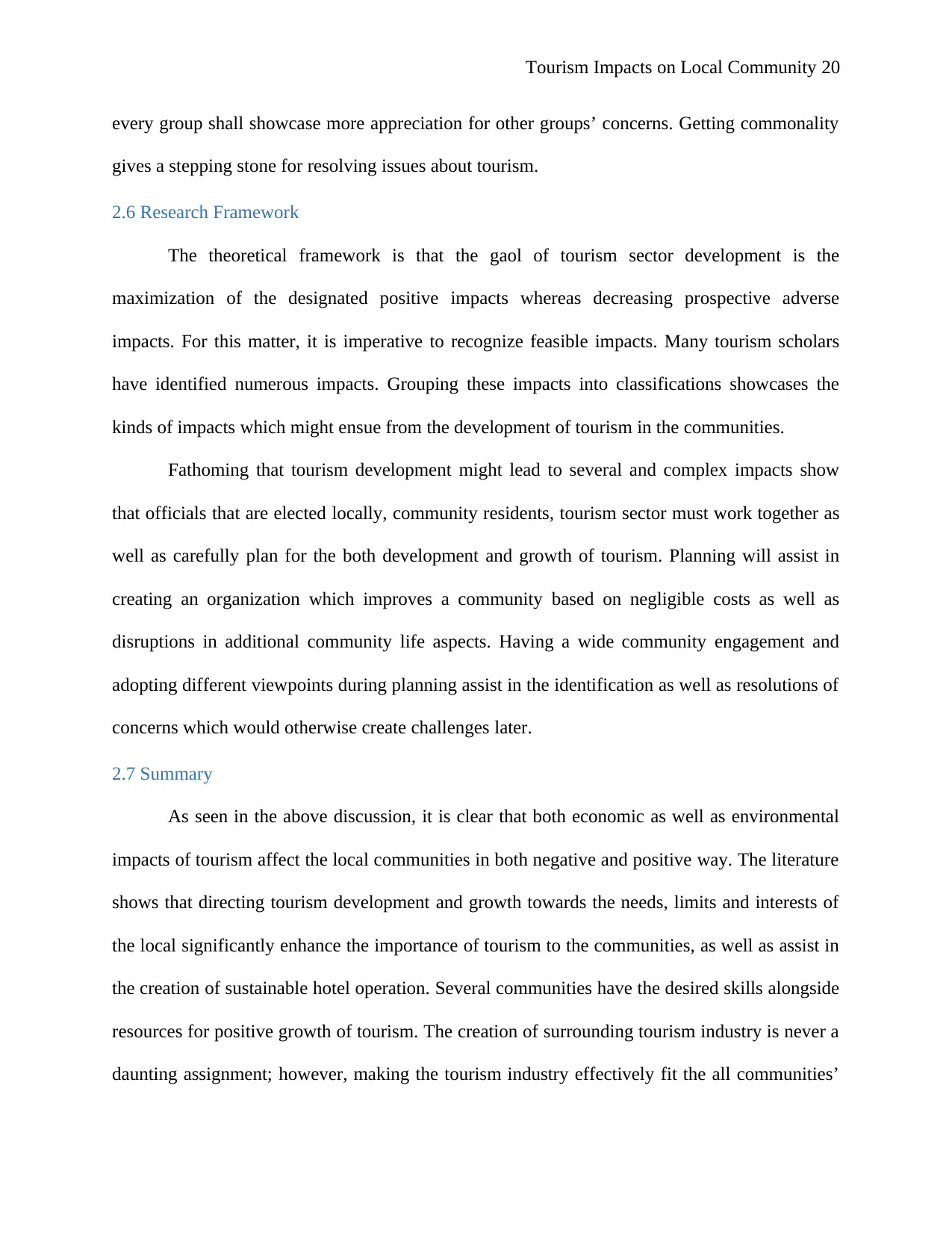
Tourism Impacts on Local Community 20
every group shall showcase more appreciation for other groups’ concerns. Getting commonality
gives a stepping stone for resolving issues about tourism.
2.6 Research Framework
The theoretical framework is that the gaol of tourism sector development is the
maximization of the designated positive impacts whereas decreasing prospective adverse
impacts. For this matter, it is imperative to recognize feasible impacts. Many tourism scholars
have identified numerous impacts. Grouping these impacts into classifications showcases the
kinds of impacts which might ensue from the development of tourism in the communities.
Fathoming that tourism development might lead to several and complex impacts show
that officials that are elected locally, community residents, tourism sector must work together as
well as carefully plan for the both development and growth of tourism. Planning will assist in
creating an organization which improves a community based on negligible costs as well as
disruptions in additional community life aspects. Having a wide community engagement and
adopting different viewpoints during planning assist in the identification as well as resolutions of
concerns which would otherwise create challenges later.
2.7 Summary
As seen in the above discussion, it is clear that both economic as well as environmental
impacts of tourism affect the local communities in both negative and positive way. The literature
shows that directing tourism development and growth towards the needs, limits and interests of
the local significantly enhance the importance of tourism to the communities, as well as assist in
the creation of sustainable hotel operation. Several communities have the desired skills alongside
resources for positive growth of tourism. The creation of surrounding tourism industry is never a
daunting assignment; however, making the tourism industry effectively fit the all communities’
every group shall showcase more appreciation for other groups’ concerns. Getting commonality
gives a stepping stone for resolving issues about tourism.
2.6 Research Framework
The theoretical framework is that the gaol of tourism sector development is the
maximization of the designated positive impacts whereas decreasing prospective adverse
impacts. For this matter, it is imperative to recognize feasible impacts. Many tourism scholars
have identified numerous impacts. Grouping these impacts into classifications showcases the
kinds of impacts which might ensue from the development of tourism in the communities.
Fathoming that tourism development might lead to several and complex impacts show
that officials that are elected locally, community residents, tourism sector must work together as
well as carefully plan for the both development and growth of tourism. Planning will assist in
creating an organization which improves a community based on negligible costs as well as
disruptions in additional community life aspects. Having a wide community engagement and
adopting different viewpoints during planning assist in the identification as well as resolutions of
concerns which would otherwise create challenges later.
2.7 Summary
As seen in the above discussion, it is clear that both economic as well as environmental
impacts of tourism affect the local communities in both negative and positive way. The literature
shows that directing tourism development and growth towards the needs, limits and interests of
the local significantly enhance the importance of tourism to the communities, as well as assist in
the creation of sustainable hotel operation. Several communities have the desired skills alongside
resources for positive growth of tourism. The creation of surrounding tourism industry is never a
daunting assignment; however, making the tourism industry effectively fit the all communities’
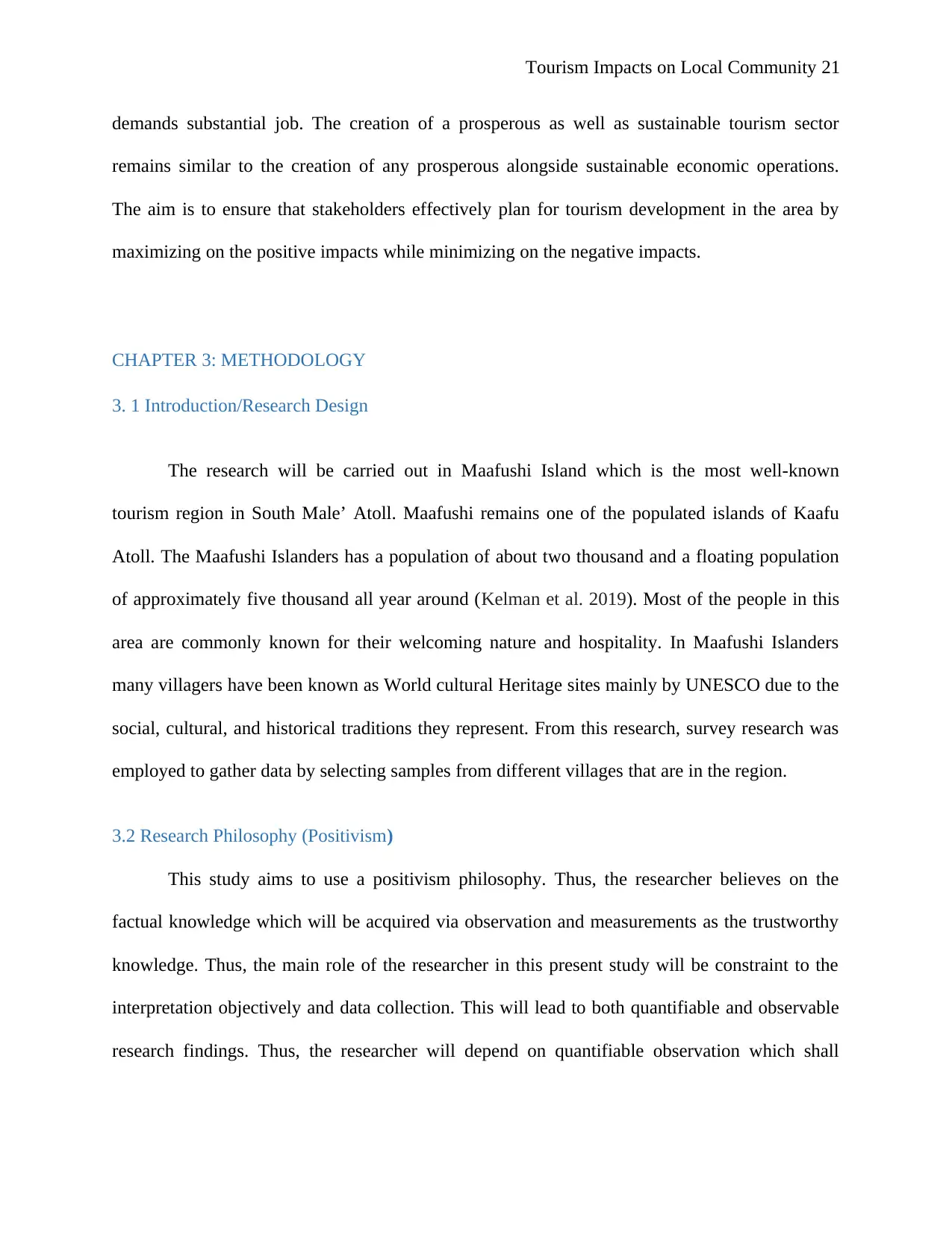
Tourism Impacts on Local Community 21
demands substantial job. The creation of a prosperous as well as sustainable tourism sector
remains similar to the creation of any prosperous alongside sustainable economic operations.
The aim is to ensure that stakeholders effectively plan for tourism development in the area by
maximizing on the positive impacts while minimizing on the negative impacts.
CHAPTER 3: METHODOLOGY
3. 1 Introduction/Research Design
The research will be carried out in Maafushi Island which is the most well-known
tourism region in South Male’ Atoll. Maafushi remains one of the populated islands of Kaafu
Atoll. The Maafushi Islanders has a population of about two thousand and a floating population
of approximately five thousand all year around (Kelman et al. 2019). Most of the people in this
area are commonly known for their welcoming nature and hospitality. In Maafushi Islanders
many villagers have been known as World cultural Heritage sites mainly by UNESCO due to the
social, cultural, and historical traditions they represent. From this research, survey research was
employed to gather data by selecting samples from different villages that are in the region.
3.2 Research Philosophy (Positivism)
This study aims to use a positivism philosophy. Thus, the researcher believes on the
factual knowledge which will be acquired via observation and measurements as the trustworthy
knowledge. Thus, the main role of the researcher in this present study will be constraint to the
interpretation objectively and data collection. This will lead to both quantifiable and observable
research findings. Thus, the researcher will depend on quantifiable observation which shall
demands substantial job. The creation of a prosperous as well as sustainable tourism sector
remains similar to the creation of any prosperous alongside sustainable economic operations.
The aim is to ensure that stakeholders effectively plan for tourism development in the area by
maximizing on the positive impacts while minimizing on the negative impacts.
CHAPTER 3: METHODOLOGY
3. 1 Introduction/Research Design
The research will be carried out in Maafushi Island which is the most well-known
tourism region in South Male’ Atoll. Maafushi remains one of the populated islands of Kaafu
Atoll. The Maafushi Islanders has a population of about two thousand and a floating population
of approximately five thousand all year around (Kelman et al. 2019). Most of the people in this
area are commonly known for their welcoming nature and hospitality. In Maafushi Islanders
many villagers have been known as World cultural Heritage sites mainly by UNESCO due to the
social, cultural, and historical traditions they represent. From this research, survey research was
employed to gather data by selecting samples from different villages that are in the region.
3.2 Research Philosophy (Positivism)
This study aims to use a positivism philosophy. Thus, the researcher believes on the
factual knowledge which will be acquired via observation and measurements as the trustworthy
knowledge. Thus, the main role of the researcher in this present study will be constraint to the
interpretation objectively and data collection. This will lead to both quantifiable and observable
research findings. Thus, the researcher will depend on quantifiable observation which shall
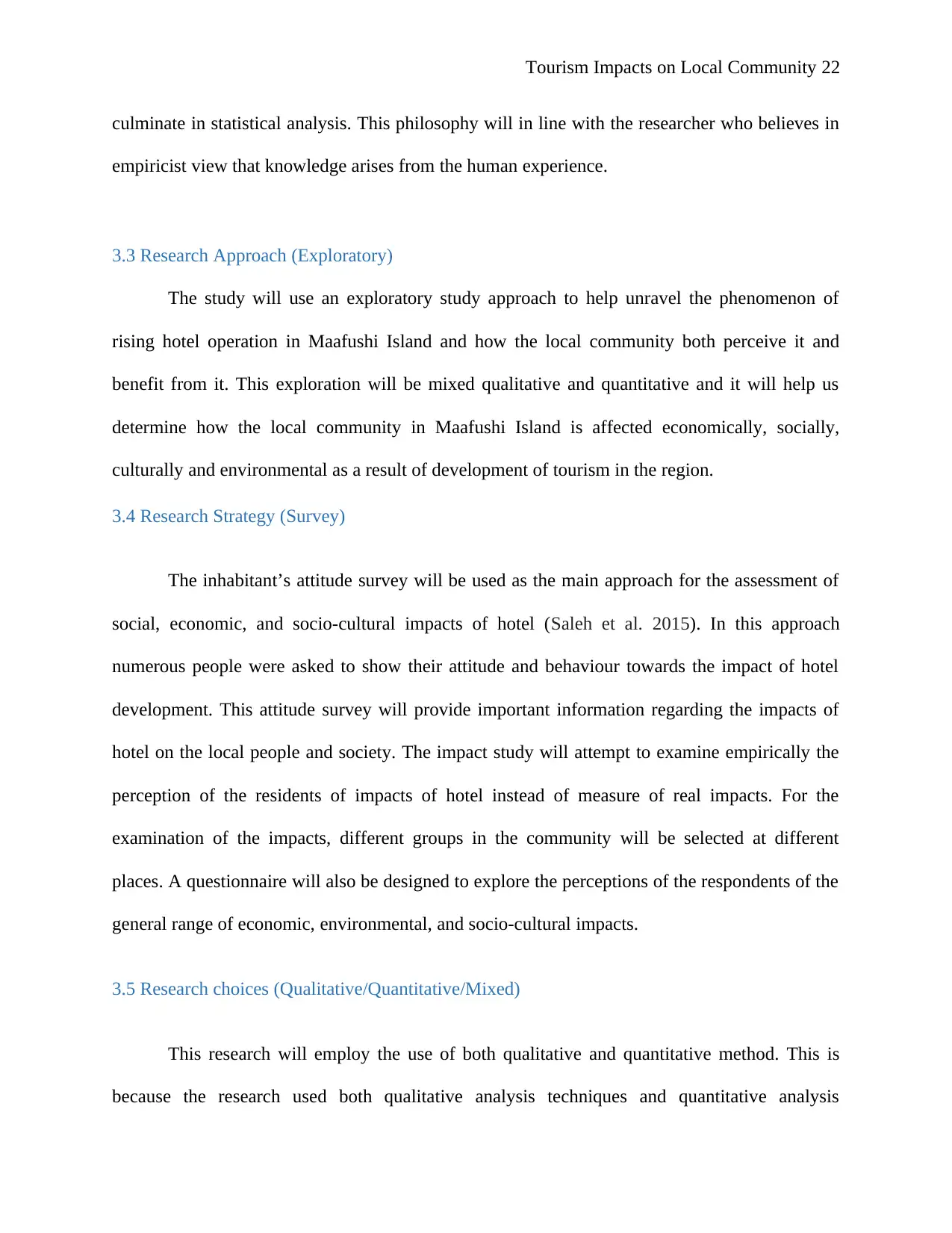
Tourism Impacts on Local Community 22
culminate in statistical analysis. This philosophy will in line with the researcher who believes in
empiricist view that knowledge arises from the human experience.
3.3 Research Approach (Exploratory)
The study will use an exploratory study approach to help unravel the phenomenon of
rising hotel operation in Maafushi Island and how the local community both perceive it and
benefit from it. This exploration will be mixed qualitative and quantitative and it will help us
determine how the local community in Maafushi Island is affected economically, socially,
culturally and environmental as a result of development of tourism in the region.
3.4 Research Strategy (Survey)
The inhabitant’s attitude survey will be used as the main approach for the assessment of
social, economic, and socio-cultural impacts of hotel (Saleh et al. 2015). In this approach
numerous people were asked to show their attitude and behaviour towards the impact of hotel
development. This attitude survey will provide important information regarding the impacts of
hotel on the local people and society. The impact study will attempt to examine empirically the
perception of the residents of impacts of hotel instead of measure of real impacts. For the
examination of the impacts, different groups in the community will be selected at different
places. A questionnaire will also be designed to explore the perceptions of the respondents of the
general range of economic, environmental, and socio-cultural impacts.
3.5 Research choices (Qualitative/Quantitative/Mixed)
This research will employ the use of both qualitative and quantitative method. This is
because the research used both qualitative analysis techniques and quantitative analysis
culminate in statistical analysis. This philosophy will in line with the researcher who believes in
empiricist view that knowledge arises from the human experience.
3.3 Research Approach (Exploratory)
The study will use an exploratory study approach to help unravel the phenomenon of
rising hotel operation in Maafushi Island and how the local community both perceive it and
benefit from it. This exploration will be mixed qualitative and quantitative and it will help us
determine how the local community in Maafushi Island is affected economically, socially,
culturally and environmental as a result of development of tourism in the region.
3.4 Research Strategy (Survey)
The inhabitant’s attitude survey will be used as the main approach for the assessment of
social, economic, and socio-cultural impacts of hotel (Saleh et al. 2015). In this approach
numerous people were asked to show their attitude and behaviour towards the impact of hotel
development. This attitude survey will provide important information regarding the impacts of
hotel on the local people and society. The impact study will attempt to examine empirically the
perception of the residents of impacts of hotel instead of measure of real impacts. For the
examination of the impacts, different groups in the community will be selected at different
places. A questionnaire will also be designed to explore the perceptions of the respondents of the
general range of economic, environmental, and socio-cultural impacts.
3.5 Research choices (Qualitative/Quantitative/Mixed)
This research will employ the use of both qualitative and quantitative method. This is
because the research used both qualitative analysis techniques and quantitative analysis
Secure Best Marks with AI Grader
Need help grading? Try our AI Grader for instant feedback on your assignments.
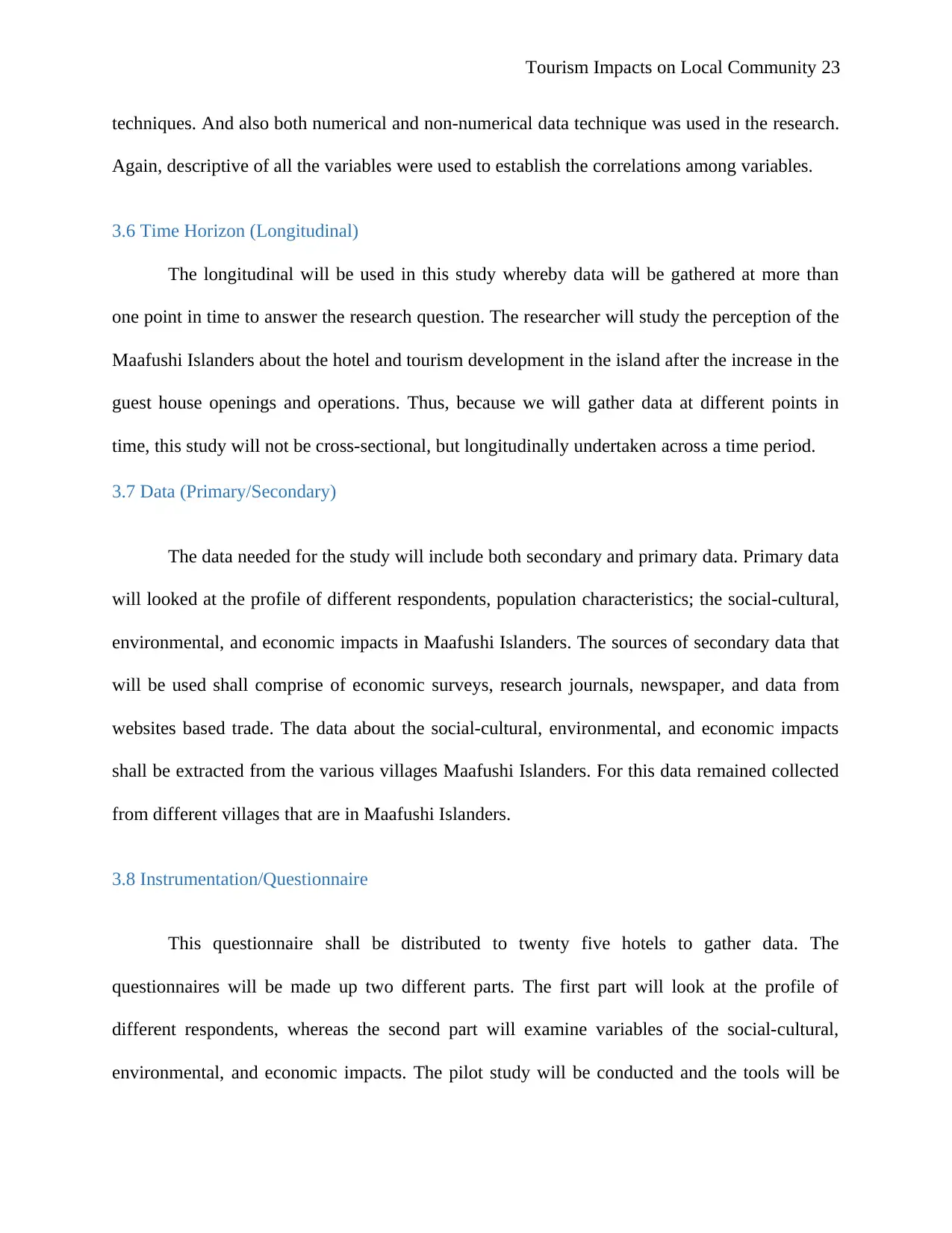
Tourism Impacts on Local Community 23
techniques. And also both numerical and non-numerical data technique was used in the research.
Again, descriptive of all the variables were used to establish the correlations among variables.
3.6 Time Horizon (Longitudinal)
The longitudinal will be used in this study whereby data will be gathered at more than
one point in time to answer the research question. The researcher will study the perception of the
Maafushi Islanders about the hotel and tourism development in the island after the increase in the
guest house openings and operations. Thus, because we will gather data at different points in
time, this study will not be cross-sectional, but longitudinally undertaken across a time period.
3.7 Data (Primary/Secondary)
The data needed for the study will include both secondary and primary data. Primary data
will looked at the profile of different respondents, population characteristics; the social-cultural,
environmental, and economic impacts in Maafushi Islanders. The sources of secondary data that
will be used shall comprise of economic surveys, research journals, newspaper, and data from
websites based trade. The data about the social-cultural, environmental, and economic impacts
shall be extracted from the various villages Maafushi Islanders. For this data remained collected
from different villages that are in Maafushi Islanders.
3.8 Instrumentation/Questionnaire
This questionnaire shall be distributed to twenty five hotels to gather data. The
questionnaires will be made up two different parts. The first part will look at the profile of
different respondents, whereas the second part will examine variables of the social-cultural,
environmental, and economic impacts. The pilot study will be conducted and the tools will be
techniques. And also both numerical and non-numerical data technique was used in the research.
Again, descriptive of all the variables were used to establish the correlations among variables.
3.6 Time Horizon (Longitudinal)
The longitudinal will be used in this study whereby data will be gathered at more than
one point in time to answer the research question. The researcher will study the perception of the
Maafushi Islanders about the hotel and tourism development in the island after the increase in the
guest house openings and operations. Thus, because we will gather data at different points in
time, this study will not be cross-sectional, but longitudinally undertaken across a time period.
3.7 Data (Primary/Secondary)
The data needed for the study will include both secondary and primary data. Primary data
will looked at the profile of different respondents, population characteristics; the social-cultural,
environmental, and economic impacts in Maafushi Islanders. The sources of secondary data that
will be used shall comprise of economic surveys, research journals, newspaper, and data from
websites based trade. The data about the social-cultural, environmental, and economic impacts
shall be extracted from the various villages Maafushi Islanders. For this data remained collected
from different villages that are in Maafushi Islanders.
3.8 Instrumentation/Questionnaire
This questionnaire shall be distributed to twenty five hotels to gather data. The
questionnaires will be made up two different parts. The first part will look at the profile of
different respondents, whereas the second part will examine variables of the social-cultural,
environmental, and economic impacts. The pilot study will be conducted and the tools will be
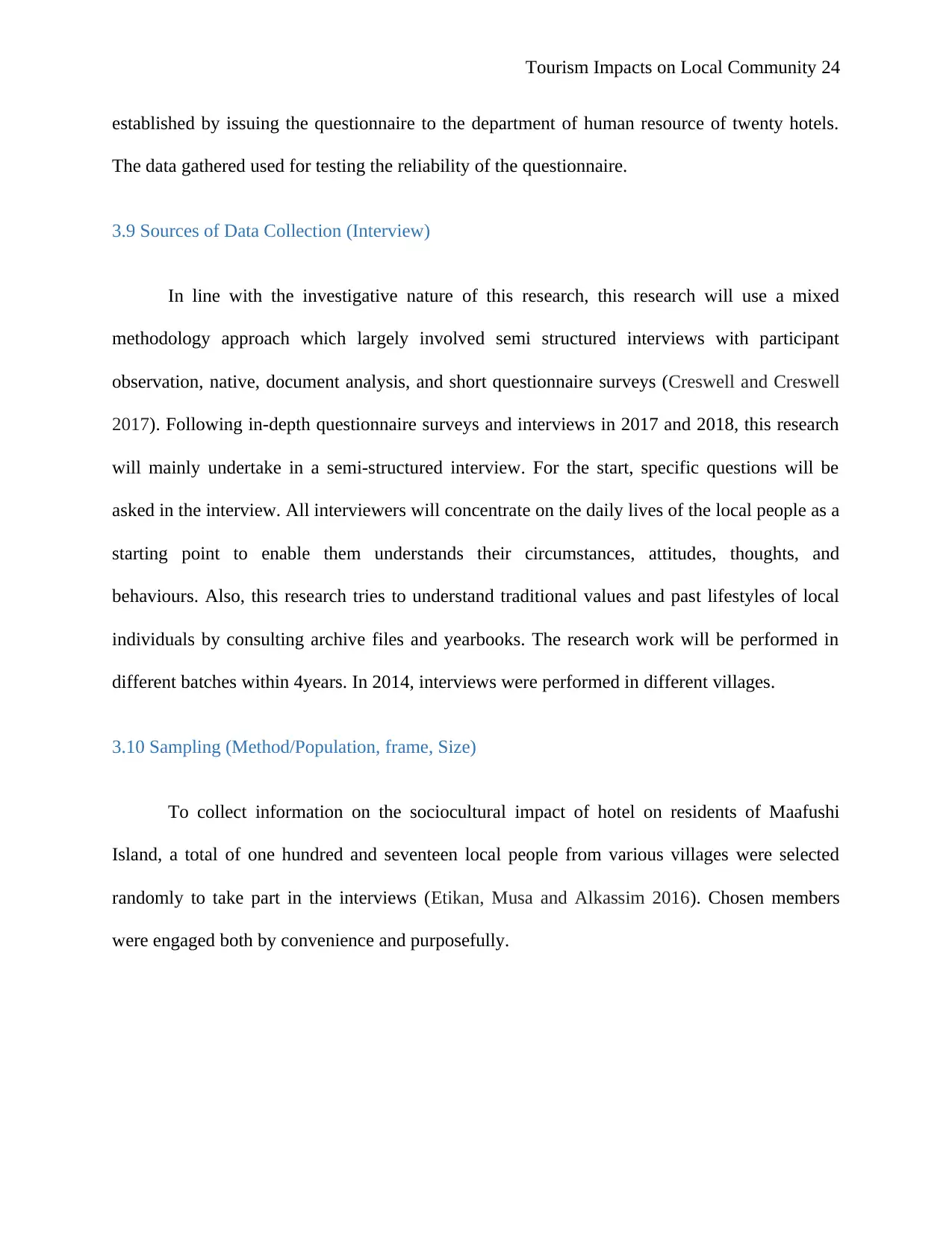
Tourism Impacts on Local Community 24
established by issuing the questionnaire to the department of human resource of twenty hotels.
The data gathered used for testing the reliability of the questionnaire.
3.9 Sources of Data Collection (Interview)
In line with the investigative nature of this research, this research will use a mixed
methodology approach which largely involved semi structured interviews with participant
observation, native, document analysis, and short questionnaire surveys (Creswell and Creswell
2017). Following in-depth questionnaire surveys and interviews in 2017 and 2018, this research
will mainly undertake in a semi-structured interview. For the start, specific questions will be
asked in the interview. All interviewers will concentrate on the daily lives of the local people as a
starting point to enable them understands their circumstances, attitudes, thoughts, and
behaviours. Also, this research tries to understand traditional values and past lifestyles of local
individuals by consulting archive files and yearbooks. The research work will be performed in
different batches within 4years. In 2014, interviews were performed in different villages.
3.10 Sampling (Method/Population, frame, Size)
To collect information on the sociocultural impact of hotel on residents of Maafushi
Island, a total of one hundred and seventeen local people from various villages were selected
randomly to take part in the interviews (Etikan, Musa and Alkassim 2016). Chosen members
were engaged both by convenience and purposefully.
established by issuing the questionnaire to the department of human resource of twenty hotels.
The data gathered used for testing the reliability of the questionnaire.
3.9 Sources of Data Collection (Interview)
In line with the investigative nature of this research, this research will use a mixed
methodology approach which largely involved semi structured interviews with participant
observation, native, document analysis, and short questionnaire surveys (Creswell and Creswell
2017). Following in-depth questionnaire surveys and interviews in 2017 and 2018, this research
will mainly undertake in a semi-structured interview. For the start, specific questions will be
asked in the interview. All interviewers will concentrate on the daily lives of the local people as a
starting point to enable them understands their circumstances, attitudes, thoughts, and
behaviours. Also, this research tries to understand traditional values and past lifestyles of local
individuals by consulting archive files and yearbooks. The research work will be performed in
different batches within 4years. In 2014, interviews were performed in different villages.
3.10 Sampling (Method/Population, frame, Size)
To collect information on the sociocultural impact of hotel on residents of Maafushi
Island, a total of one hundred and seventeen local people from various villages were selected
randomly to take part in the interviews (Etikan, Musa and Alkassim 2016). Chosen members
were engaged both by convenience and purposefully.
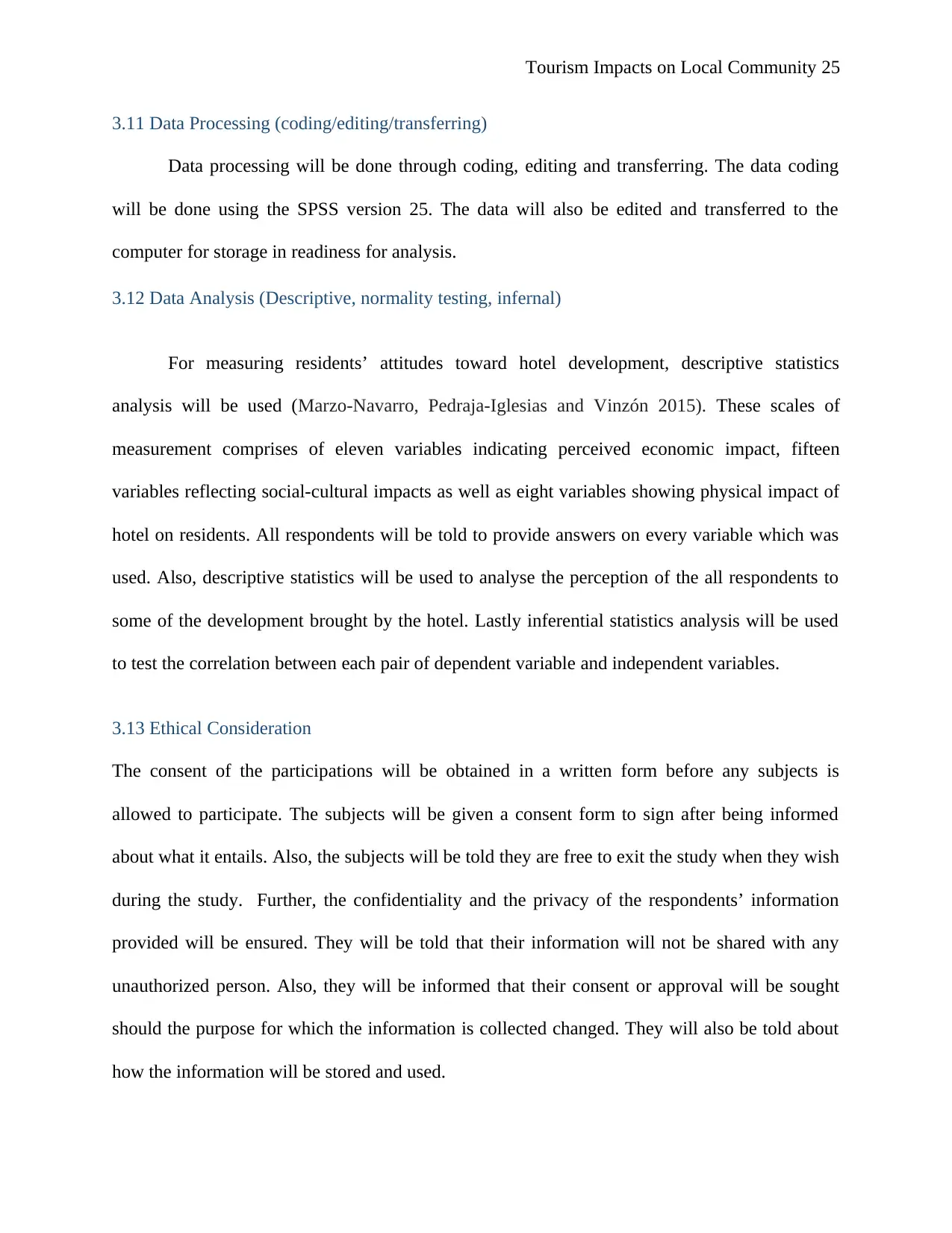
Tourism Impacts on Local Community 25
3.11 Data Processing (coding/editing/transferring)
Data processing will be done through coding, editing and transferring. The data coding
will be done using the SPSS version 25. The data will also be edited and transferred to the
computer for storage in readiness for analysis.
3.12 Data Analysis (Descriptive, normality testing, infernal)
For measuring residents’ attitudes toward hotel development, descriptive statistics
analysis will be used (Marzo-Navarro, Pedraja-Iglesias and Vinzón 2015). These scales of
measurement comprises of eleven variables indicating perceived economic impact, fifteen
variables reflecting social-cultural impacts as well as eight variables showing physical impact of
hotel on residents. All respondents will be told to provide answers on every variable which was
used. Also, descriptive statistics will be used to analyse the perception of the all respondents to
some of the development brought by the hotel. Lastly inferential statistics analysis will be used
to test the correlation between each pair of dependent variable and independent variables.
3.13 Ethical Consideration
The consent of the participations will be obtained in a written form before any subjects is
allowed to participate. The subjects will be given a consent form to sign after being informed
about what it entails. Also, the subjects will be told they are free to exit the study when they wish
during the study. Further, the confidentiality and the privacy of the respondents’ information
provided will be ensured. They will be told that their information will not be shared with any
unauthorized person. Also, they will be informed that their consent or approval will be sought
should the purpose for which the information is collected changed. They will also be told about
how the information will be stored and used.
3.11 Data Processing (coding/editing/transferring)
Data processing will be done through coding, editing and transferring. The data coding
will be done using the SPSS version 25. The data will also be edited and transferred to the
computer for storage in readiness for analysis.
3.12 Data Analysis (Descriptive, normality testing, infernal)
For measuring residents’ attitudes toward hotel development, descriptive statistics
analysis will be used (Marzo-Navarro, Pedraja-Iglesias and Vinzón 2015). These scales of
measurement comprises of eleven variables indicating perceived economic impact, fifteen
variables reflecting social-cultural impacts as well as eight variables showing physical impact of
hotel on residents. All respondents will be told to provide answers on every variable which was
used. Also, descriptive statistics will be used to analyse the perception of the all respondents to
some of the development brought by the hotel. Lastly inferential statistics analysis will be used
to test the correlation between each pair of dependent variable and independent variables.
3.13 Ethical Consideration
The consent of the participations will be obtained in a written form before any subjects is
allowed to participate. The subjects will be given a consent form to sign after being informed
about what it entails. Also, the subjects will be told they are free to exit the study when they wish
during the study. Further, the confidentiality and the privacy of the respondents’ information
provided will be ensured. They will be told that their information will not be shared with any
unauthorized person. Also, they will be informed that their consent or approval will be sought
should the purpose for which the information is collected changed. They will also be told about
how the information will be stored and used.
Paraphrase This Document
Need a fresh take? Get an instant paraphrase of this document with our AI Paraphraser
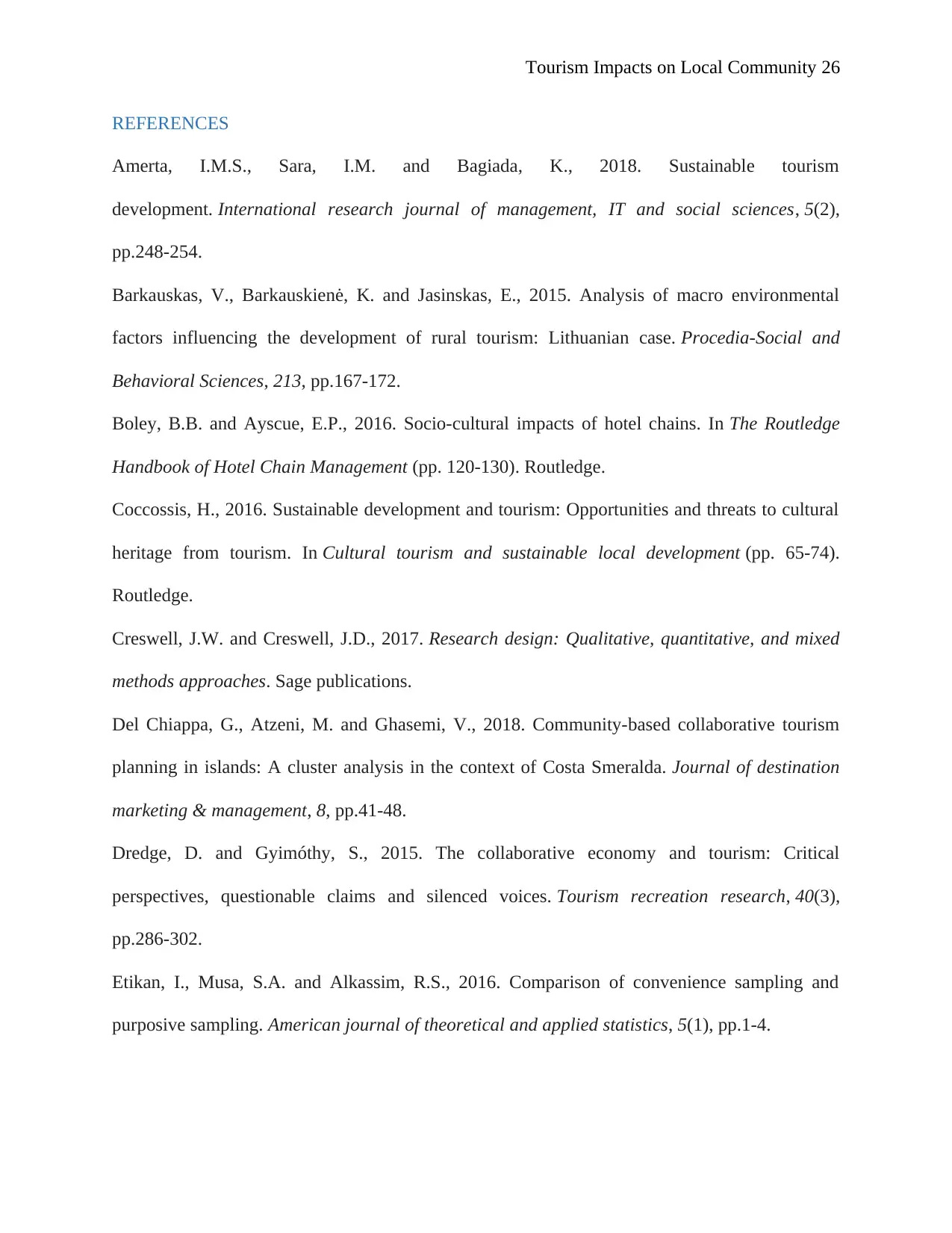
Tourism Impacts on Local Community 26
REFERENCES
Amerta, I.M.S., Sara, I.M. and Bagiada, K., 2018. Sustainable tourism
development. International research journal of management, IT and social sciences, 5(2),
pp.248-254.
Barkauskas, V., Barkauskienė, K. and Jasinskas, E., 2015. Analysis of macro environmental
factors influencing the development of rural tourism: Lithuanian case. Procedia-Social and
Behavioral Sciences, 213, pp.167-172.
Boley, B.B. and Ayscue, E.P., 2016. Socio-cultural impacts of hotel chains. In The Routledge
Handbook of Hotel Chain Management (pp. 120-130). Routledge.
Coccossis, H., 2016. Sustainable development and tourism: Opportunities and threats to cultural
heritage from tourism. In Cultural tourism and sustainable local development (pp. 65-74).
Routledge.
Creswell, J.W. and Creswell, J.D., 2017. Research design: Qualitative, quantitative, and mixed
methods approaches. Sage publications.
Del Chiappa, G., Atzeni, M. and Ghasemi, V., 2018. Community-based collaborative tourism
planning in islands: A cluster analysis in the context of Costa Smeralda. Journal of destination
marketing & management, 8, pp.41-48.
Dredge, D. and Gyimóthy, S., 2015. The collaborative economy and tourism: Critical
perspectives, questionable claims and silenced voices. Tourism recreation research, 40(3),
pp.286-302.
Etikan, I., Musa, S.A. and Alkassim, R.S., 2016. Comparison of convenience sampling and
purposive sampling. American journal of theoretical and applied statistics, 5(1), pp.1-4.
REFERENCES
Amerta, I.M.S., Sara, I.M. and Bagiada, K., 2018. Sustainable tourism
development. International research journal of management, IT and social sciences, 5(2),
pp.248-254.
Barkauskas, V., Barkauskienė, K. and Jasinskas, E., 2015. Analysis of macro environmental
factors influencing the development of rural tourism: Lithuanian case. Procedia-Social and
Behavioral Sciences, 213, pp.167-172.
Boley, B.B. and Ayscue, E.P., 2016. Socio-cultural impacts of hotel chains. In The Routledge
Handbook of Hotel Chain Management (pp. 120-130). Routledge.
Coccossis, H., 2016. Sustainable development and tourism: Opportunities and threats to cultural
heritage from tourism. In Cultural tourism and sustainable local development (pp. 65-74).
Routledge.
Creswell, J.W. and Creswell, J.D., 2017. Research design: Qualitative, quantitative, and mixed
methods approaches. Sage publications.
Del Chiappa, G., Atzeni, M. and Ghasemi, V., 2018. Community-based collaborative tourism
planning in islands: A cluster analysis in the context of Costa Smeralda. Journal of destination
marketing & management, 8, pp.41-48.
Dredge, D. and Gyimóthy, S., 2015. The collaborative economy and tourism: Critical
perspectives, questionable claims and silenced voices. Tourism recreation research, 40(3),
pp.286-302.
Etikan, I., Musa, S.A. and Alkassim, R.S., 2016. Comparison of convenience sampling and
purposive sampling. American journal of theoretical and applied statistics, 5(1), pp.1-4.
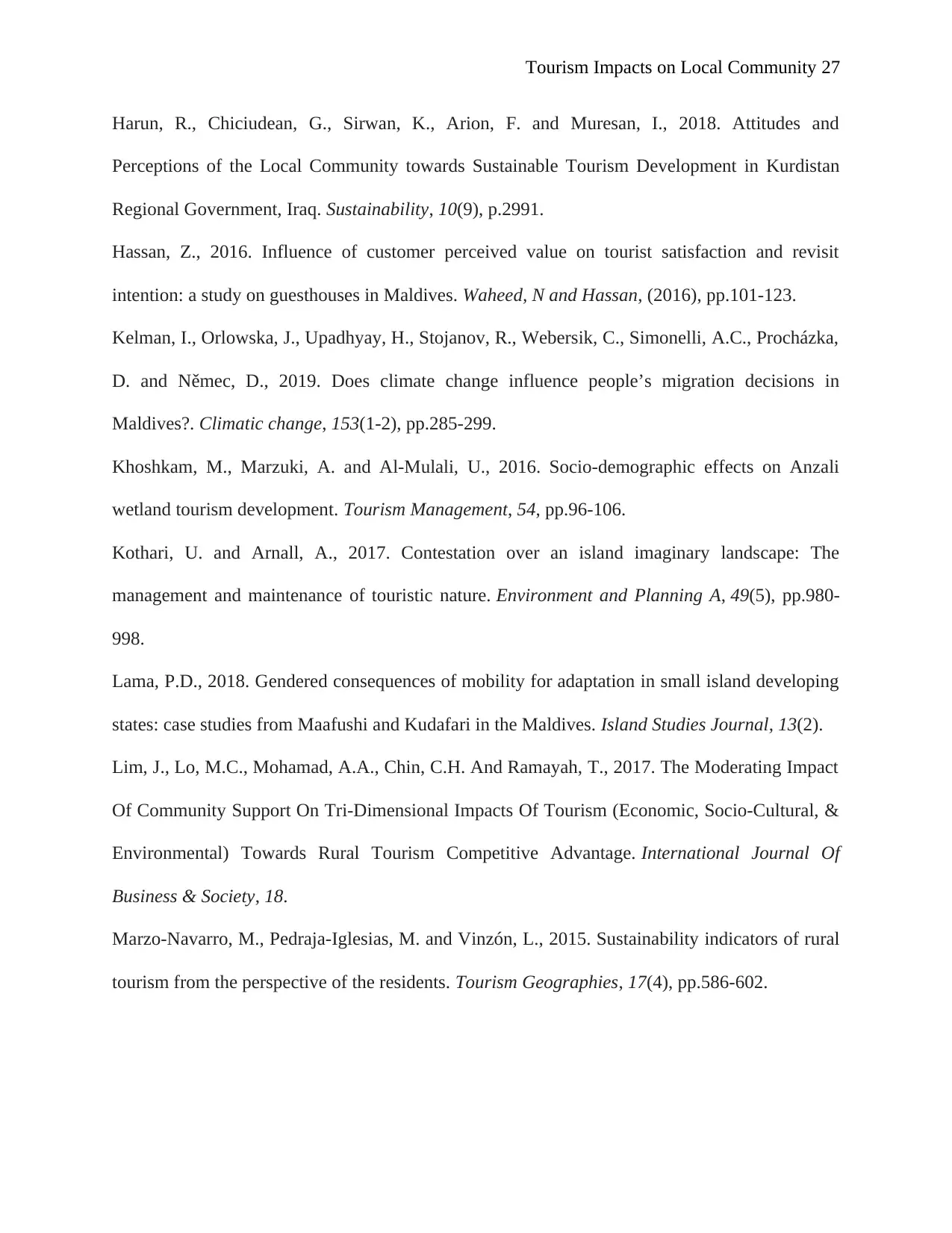
Tourism Impacts on Local Community 27
Harun, R., Chiciudean, G., Sirwan, K., Arion, F. and Muresan, I., 2018. Attitudes and
Perceptions of the Local Community towards Sustainable Tourism Development in Kurdistan
Regional Government, Iraq. Sustainability, 10(9), p.2991.
Hassan, Z., 2016. Influence of customer perceived value on tourist satisfaction and revisit
intention: a study on guesthouses in Maldives. Waheed, N and Hassan, (2016), pp.101-123.
Kelman, I., Orlowska, J., Upadhyay, H., Stojanov, R., Webersik, C., Simonelli, A.C., Procházka,
D. and Němec, D., 2019. Does climate change influence people’s migration decisions in
Maldives?. Climatic change, 153(1-2), pp.285-299.
Khoshkam, M., Marzuki, A. and Al-Mulali, U., 2016. Socio-demographic effects on Anzali
wetland tourism development. Tourism Management, 54, pp.96-106.
Kothari, U. and Arnall, A., 2017. Contestation over an island imaginary landscape: The
management and maintenance of touristic nature. Environment and Planning A, 49(5), pp.980-
998.
Lama, P.D., 2018. Gendered consequences of mobility for adaptation in small island developing
states: case studies from Maafushi and Kudafari in the Maldives. Island Studies Journal, 13(2).
Lim, J., Lo, M.C., Mohamad, A.A., Chin, C.H. And Ramayah, T., 2017. The Moderating Impact
Of Community Support On Tri-Dimensional Impacts Of Tourism (Economic, Socio-Cultural, &
Environmental) Towards Rural Tourism Competitive Advantage. International Journal Of
Business & Society, 18.
Marzo-Navarro, M., Pedraja-Iglesias, M. and Vinzón, L., 2015. Sustainability indicators of rural
tourism from the perspective of the residents. Tourism Geographies, 17(4), pp.586-602.
Harun, R., Chiciudean, G., Sirwan, K., Arion, F. and Muresan, I., 2018. Attitudes and
Perceptions of the Local Community towards Sustainable Tourism Development in Kurdistan
Regional Government, Iraq. Sustainability, 10(9), p.2991.
Hassan, Z., 2016. Influence of customer perceived value on tourist satisfaction and revisit
intention: a study on guesthouses in Maldives. Waheed, N and Hassan, (2016), pp.101-123.
Kelman, I., Orlowska, J., Upadhyay, H., Stojanov, R., Webersik, C., Simonelli, A.C., Procházka,
D. and Němec, D., 2019. Does climate change influence people’s migration decisions in
Maldives?. Climatic change, 153(1-2), pp.285-299.
Khoshkam, M., Marzuki, A. and Al-Mulali, U., 2016. Socio-demographic effects on Anzali
wetland tourism development. Tourism Management, 54, pp.96-106.
Kothari, U. and Arnall, A., 2017. Contestation over an island imaginary landscape: The
management and maintenance of touristic nature. Environment and Planning A, 49(5), pp.980-
998.
Lama, P.D., 2018. Gendered consequences of mobility for adaptation in small island developing
states: case studies from Maafushi and Kudafari in the Maldives. Island Studies Journal, 13(2).
Lim, J., Lo, M.C., Mohamad, A.A., Chin, C.H. And Ramayah, T., 2017. The Moderating Impact
Of Community Support On Tri-Dimensional Impacts Of Tourism (Economic, Socio-Cultural, &
Environmental) Towards Rural Tourism Competitive Advantage. International Journal Of
Business & Society, 18.
Marzo-Navarro, M., Pedraja-Iglesias, M. and Vinzón, L., 2015. Sustainability indicators of rural
tourism from the perspective of the residents. Tourism Geographies, 17(4), pp.586-602.
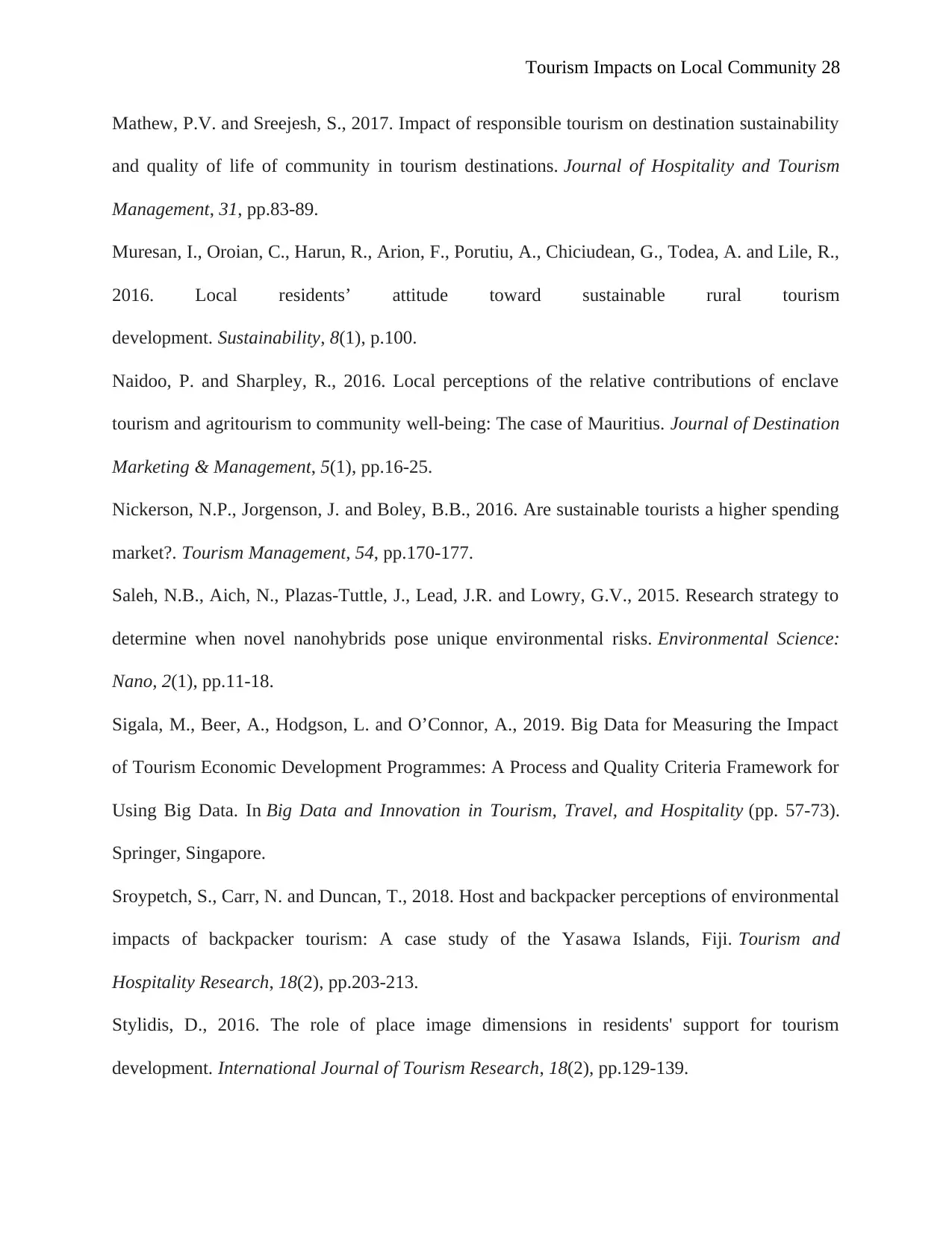
Tourism Impacts on Local Community 28
Mathew, P.V. and Sreejesh, S., 2017. Impact of responsible tourism on destination sustainability
and quality of life of community in tourism destinations. Journal of Hospitality and Tourism
Management, 31, pp.83-89.
Muresan, I., Oroian, C., Harun, R., Arion, F., Porutiu, A., Chiciudean, G., Todea, A. and Lile, R.,
2016. Local residents’ attitude toward sustainable rural tourism
development. Sustainability, 8(1), p.100.
Naidoo, P. and Sharpley, R., 2016. Local perceptions of the relative contributions of enclave
tourism and agritourism to community well-being: The case of Mauritius. Journal of Destination
Marketing & Management, 5(1), pp.16-25.
Nickerson, N.P., Jorgenson, J. and Boley, B.B., 2016. Are sustainable tourists a higher spending
market?. Tourism Management, 54, pp.170-177.
Saleh, N.B., Aich, N., Plazas-Tuttle, J., Lead, J.R. and Lowry, G.V., 2015. Research strategy to
determine when novel nanohybrids pose unique environmental risks. Environmental Science:
Nano, 2(1), pp.11-18.
Sigala, M., Beer, A., Hodgson, L. and O’Connor, A., 2019. Big Data for Measuring the Impact
of Tourism Economic Development Programmes: A Process and Quality Criteria Framework for
Using Big Data. In Big Data and Innovation in Tourism, Travel, and Hospitality (pp. 57-73).
Springer, Singapore.
Sroypetch, S., Carr, N. and Duncan, T., 2018. Host and backpacker perceptions of environmental
impacts of backpacker tourism: A case study of the Yasawa Islands, Fiji. Tourism and
Hospitality Research, 18(2), pp.203-213.
Stylidis, D., 2016. The role of place image dimensions in residents' support for tourism
development. International Journal of Tourism Research, 18(2), pp.129-139.
Mathew, P.V. and Sreejesh, S., 2017. Impact of responsible tourism on destination sustainability
and quality of life of community in tourism destinations. Journal of Hospitality and Tourism
Management, 31, pp.83-89.
Muresan, I., Oroian, C., Harun, R., Arion, F., Porutiu, A., Chiciudean, G., Todea, A. and Lile, R.,
2016. Local residents’ attitude toward sustainable rural tourism
development. Sustainability, 8(1), p.100.
Naidoo, P. and Sharpley, R., 2016. Local perceptions of the relative contributions of enclave
tourism and agritourism to community well-being: The case of Mauritius. Journal of Destination
Marketing & Management, 5(1), pp.16-25.
Nickerson, N.P., Jorgenson, J. and Boley, B.B., 2016. Are sustainable tourists a higher spending
market?. Tourism Management, 54, pp.170-177.
Saleh, N.B., Aich, N., Plazas-Tuttle, J., Lead, J.R. and Lowry, G.V., 2015. Research strategy to
determine when novel nanohybrids pose unique environmental risks. Environmental Science:
Nano, 2(1), pp.11-18.
Sigala, M., Beer, A., Hodgson, L. and O’Connor, A., 2019. Big Data for Measuring the Impact
of Tourism Economic Development Programmes: A Process and Quality Criteria Framework for
Using Big Data. In Big Data and Innovation in Tourism, Travel, and Hospitality (pp. 57-73).
Springer, Singapore.
Sroypetch, S., Carr, N. and Duncan, T., 2018. Host and backpacker perceptions of environmental
impacts of backpacker tourism: A case study of the Yasawa Islands, Fiji. Tourism and
Hospitality Research, 18(2), pp.203-213.
Stylidis, D., 2016. The role of place image dimensions in residents' support for tourism
development. International Journal of Tourism Research, 18(2), pp.129-139.
Secure Best Marks with AI Grader
Need help grading? Try our AI Grader for instant feedback on your assignments.
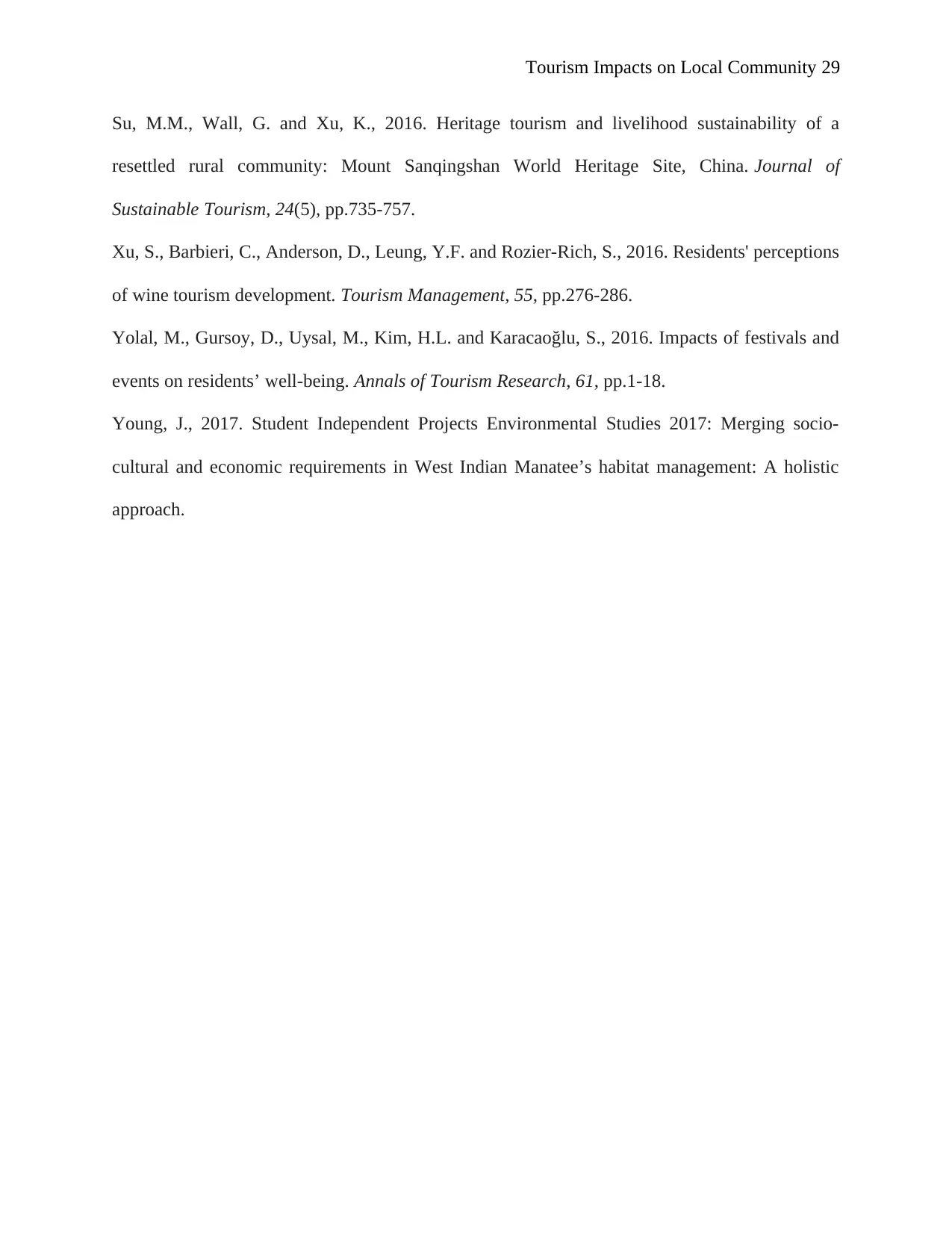
Tourism Impacts on Local Community 29
Su, M.M., Wall, G. and Xu, K., 2016. Heritage tourism and livelihood sustainability of a
resettled rural community: Mount Sanqingshan World Heritage Site, China. Journal of
Sustainable Tourism, 24(5), pp.735-757.
Xu, S., Barbieri, C., Anderson, D., Leung, Y.F. and Rozier-Rich, S., 2016. Residents' perceptions
of wine tourism development. Tourism Management, 55, pp.276-286.
Yolal, M., Gursoy, D., Uysal, M., Kim, H.L. and Karacaoğlu, S., 2016. Impacts of festivals and
events on residents’ well-being. Annals of Tourism Research, 61, pp.1-18.
Young, J., 2017. Student Independent Projects Environmental Studies 2017: Merging socio-
cultural and economic requirements in West Indian Manatee’s habitat management: A holistic
approach.
Su, M.M., Wall, G. and Xu, K., 2016. Heritage tourism and livelihood sustainability of a
resettled rural community: Mount Sanqingshan World Heritage Site, China. Journal of
Sustainable Tourism, 24(5), pp.735-757.
Xu, S., Barbieri, C., Anderson, D., Leung, Y.F. and Rozier-Rich, S., 2016. Residents' perceptions
of wine tourism development. Tourism Management, 55, pp.276-286.
Yolal, M., Gursoy, D., Uysal, M., Kim, H.L. and Karacaoğlu, S., 2016. Impacts of festivals and
events on residents’ well-being. Annals of Tourism Research, 61, pp.1-18.
Young, J., 2017. Student Independent Projects Environmental Studies 2017: Merging socio-
cultural and economic requirements in West Indian Manatee’s habitat management: A holistic
approach.
1 out of 29
Related Documents
Your All-in-One AI-Powered Toolkit for Academic Success.
+13062052269
info@desklib.com
Available 24*7 on WhatsApp / Email
![[object Object]](/_next/static/media/star-bottom.7253800d.svg)
Unlock your academic potential
© 2024 | Zucol Services PVT LTD | All rights reserved.





